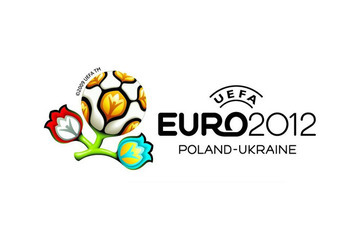- Hata
-
- JUser::_load: Unable to load user with id: 62
 HABERLER & MAKALELER
HABERLER & MAKALELER  Genel
Genel  Diğer Yazarlar
Diğer Yazarlar  The 50 Greatest World Football Club Teams of All Time
The 50 Greatest World Football Club Teams of All Time
| The 50 Greatest World Football Club Teams of All Time |
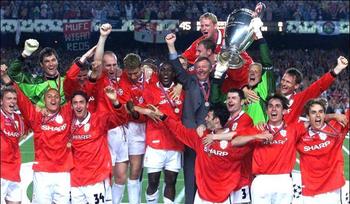
25 March 2011- Every season there are great teams in world football. It's just a fact of life in the modern game; someone is always doing something big, with a superb level of talent. But, every once in a while, a team comes along who is truly special. Their play is something to behold, their accomplishments and trophies become the stuff of legends, their names will undoubtedly be etched in the annals of history. These are the teams we're interested in. The sides that are still spoken of in reverent tones, those whose talent has placed them on hallowed ground as one of the 50 greatest club teams in world football history. We're focusing solely on club teams and on specific years whenever possible, breaking down the greatest teams the football world has ever seen. So, lace up your cleats, grab your Lisbon Lions scarf and Man U treble memorial kit and let's get started, shall we? 50. Hamburger SV, 1982-83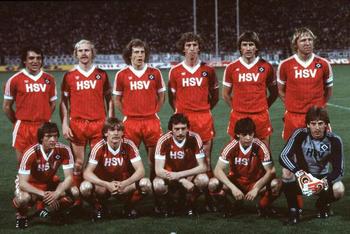 One of the forgotten teams of the late 1970s and early 1980s, HSV was the dominant force in German soccer from 1976-1983 and ascended to the pinnacle of greatness with a European Cup (the predecessor of the Champion's League) title in 1983. This talented club was led by national star Felix Nagath, who guided Hamburger to the Bundesliga title, the European Cup title and a runner-up finish in the European Super Cup. They also took home the Intercontinental Cup in 1983 and have one of the more underrated coaches in Ernst Happel. This team has always been the forgotten EC champ, but they're more than worthy of a spot on this list.
49. Boca Juniors, 2005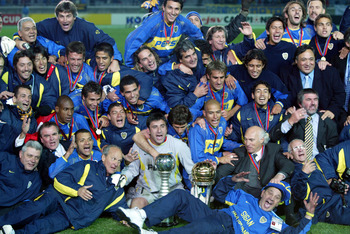 Koichi Kamoshida/Getty Images Boca has had some stellar teams over the years, particularly during the Diego Maradona era of the early 1980s. But few teams could match the success domestically or abroad of the 2003 squad. With a league title secured, Boca set its sights on the Copa Libertadores, the South American equivalent of the Champions League, ultimately winning the prize convincingly. As if that weren't enough, Boca also netted the Intercontinental Cup, beating an incredibly talented AC Milan club to become world champs. Led by a young Carlos Tevez off the bench, Matias Donnet in the midfield and a sturdy defense behind them, Boca are still looked upon as one of the best teams of the decade, if not of all time.
48. Manchester United, 1993-94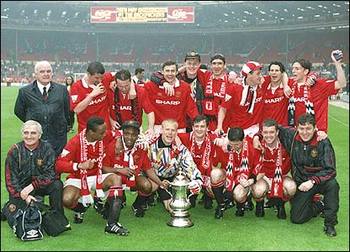 While this Man U installment pales in comparison to some of the others on this list, it's here for the history it managed to achieve and the sheer talent in the club. The 1993-94 Red Devils scored their first league title since 1967 and netted the first double in club history, winning the Premiership and the FA Cup. United was close to the domestic treble, but they were defeated by Aston Villa in the League Cup Final. With midfielders Ryan Giggs, Paul Ince, Andrei Kanchelski and Lee Sharpe, forwards Eric Cantona and Mark Hughes, defensive midfielder Roy Keane and golkeeper Peter Schmiel, the nucleus of this Man U squad might have been one of the most successful in history. Because they got their start in this magical run, the '93-94 United squad makes the list.
47. Sao Paolo, 1993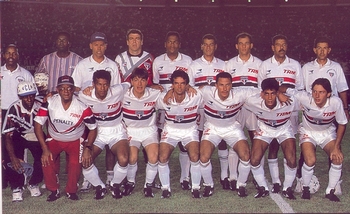 Few teams in the world could match the success found by Brazilian giants Sao Paulo in the early 1990s. Under legendary head coach Tele Santana, Sao Paulo reached the pinnacle of their powers during the 1993 season. While they failed to win the Brazilian Championship (the rules seem to change each year to best fit a certain team's preferences, so it's tough to win one), Sao Paulo won pretty much every other competition they entered, including the Supercopa Sudamerica, the Recopa Sudamerica, the Copa Libertadores and the Intercontinental Cup. Led by superstar midfielder Rai and goalkeeper Zetti, Sao Paulo's run of dominance on the world scene won't soon be replicated, particularly in South America. 46. Arsenal, 1930s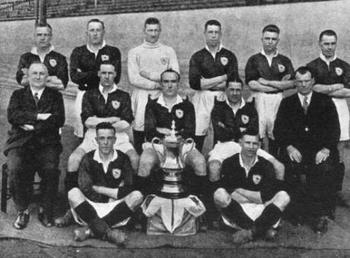 The dominant force in English football in the 1930s was undoubtedly the Gunners. Led by managers Herbert Chapman, Joe Shaw and George Allison, Arsenal dominated the English football landscape, winning the FA Cup in 1930 and 1938 and the league title in 1931-32, 1932-33, 1933-34, 1934-35 and 1936-37. The Gunners were led by stars Alex James and Cliff Bastin, a pair of players lured to Highbury by the promise of higher wages. The clubs fortunes waned with World War II, and while they've found some success since then, the old timers still gush about this decade of greatness.
45. Kispest Honved AC, 1953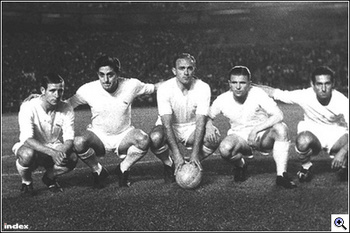 When the military took over Hungarian club Kispest FC in Budapest, they immediately took all of the top players from rival teams to essentially create a practice squad for the Hungarian national team. What a team it was, too! Led by some of the brightest stars of the day, including goal scorers Ferenc Puskas and Sandor Kocsis, winger Zoltan Czibor, midfielder Laszlo Budai and goalkeepers Gyula Lorant and Gyula Grosics. The Might Magyars ran roughshod over much of Europe and pushed English club Wolverhampton Wanderers to the brink of defeat and would have were it not for serious gamesmanship from Wolves manager Stan Cullis, who ordered the pitch flooded to prevent Honved from using their precise passes to full effect. It worked, as the Hungarians fell 3-2 in 1953, but not before establishing themselves as the dominant force in European football. Sadly, it would not last, as the Hungarian government collapsed in 1956, and the Honved players scattered to the winds, never getting the chance to win a European Cup.
44. Chelsea 2004-05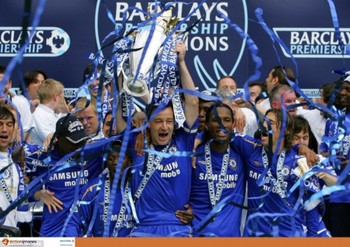 The Blues finally broke through in 2004-05, their first full season under Jose Mourinho. They ran away with the Premiership title, taking it by a comfortable 12 points over second-place Arsenal. Featuring goalkeeper Peter Cech at the height of his powers, defenders John Terry, Glen Johnson, Ricardo Carvalho and William Gallas; midfielders like Joe Cole, Damien Duff, Arjen Robben and a suddenly revitalized Claude Makelele; and forwards Didier Drogba and a still dangerous Eiour Guojohnsen, this Chelsea side remains the most successful side of all time, winning the Premiership, the Carling Cup and advancing to the semifinals of the Champion's League. Sure, the 2007-08 squad may have been more talented, but with second place finishes in the Carling Cup, the Premiership and Champions League, winning beats out talent for a spot on the list.
43. PSV Eindhoven, 1987-88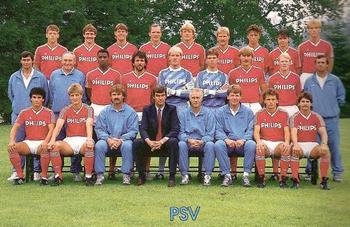 PSV Eindhoven have a history of being one of the best clubs in the Dutch Eredivisie, along with Ajax (and occasionally, Feyenoord). But, in 1987-88, under the tutelage of legendary manager Guus Hiddink, Eindhoven had one of the greatest runs Dutch football has ever seen. They ran away with the Eredivisie title, as well as the KNVB Cup (the Netherlands' League Cup) and, most importantly, beat Benfica in the European Cup finals, winning a 0-0 draw in a shootout. Interestingly, PSV didn't win any of their last five European Cup matches, playing each opponent to a draw and winning on away goals. Led by stars Ronald Koeman, Eric Gerets, Soren Lerby, Wim Kieft and goalkeeper Hans van Breukelen, PSV remain one of better teams of all time.
42. Dynamo Kiev, 1986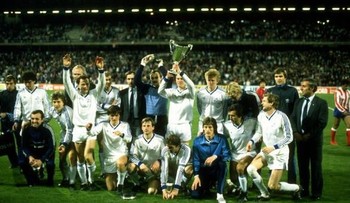 Dynamo Kiev have long been the dominant force in Ukranian football, but in the 1970s and 80s, they were the dominant force in all of Soviet football, ruling the league. Under the tutelage of legendary manager Valeriy Lobanovskyi, Kiev took home the European Cup Winners' Cup in 1986 and finished second in the European Super Cup to Steaua Bucharest. Led by the superb Oleg Blokhin, Kiev were the dominant force in football in the Soviet Bloc during this era, and while the 1875 edition was more successful, the 1986 team is typically considered the more superior unit.
41. Arsenal, 2003-04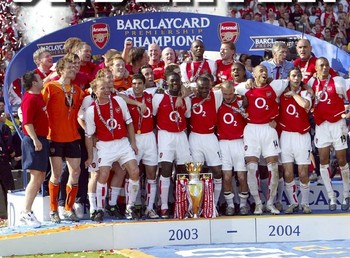 No team in the modern era of football has found more success in domestic competition than the 2003-04 Arsenal side that ran roughshod over the English Premier League. Led by manager Arsene Wenger, the Gunners finished the season undefeated, the first side since Preston North End in 1889 to accomplish such a feat in English football. With a dynamic attack featuring forwards Dennis Bergkamp and Thierry Henry (Robin van Persie and Cesc Fabregas were a part of the squad, but didn't play a match for Arsenal) and aided by the likes of Patrick Viera, Freddy Ljundberg, Gilberto and Robert Pires in the midfield, the Gunners attack was as formidable as it is today. The difference is the Gunners had a defense worthy of their elite attack. Led by Ashley Cole, Sol Campbell and Kolo Toure, and anchored by Jens Lehmann, Arsenal's back line was as sturdy as they come. There weren't many trophies at Emirates Stadium that season, as the Gunners fell to Chelsea in the Champion's League quarterfinals, to Manchester United in the FA Cup semis and fell in the Carling Cup semis as well. Even so, with the dominance of their domestic season, the Gunners more than merit a spot on the list.
40. Bayern Munich, 2001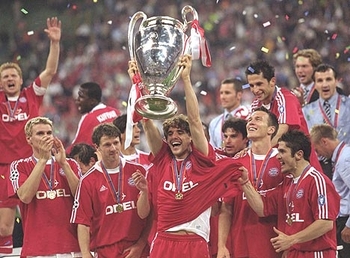 Coming into the 2000-01 campaign, much was expected of Bayern Munich. After all, they had won two straight Bundesliga titles, but had failed to translate that into any success on the international level, falling in the Champions League each time. However, Bayern would break through that season, taking the Bundesliga title and eventually wrapping up their first Champions League title in 25 years, ending their international drought in the process. Anchored by venerable keeper Oliver Kahn (who was old enough to have played in their last European success), Munich used a relentless attack powered by the likes of Giovane Elber, Carston Jancker, Roque Santa Cruz and Mehmet Scholl to overwhelm opponents, confident in the knowledge that Kahn had their back. As if this weren't enough, Bayern would roll through the Intercontinental Cup as well, cementing their status as the world's best team.
39. Real Madrid, 1957-58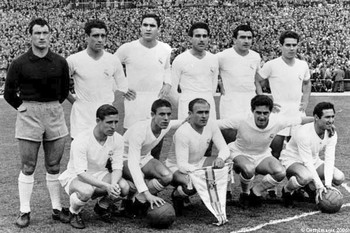 From 1955-1960, Real Madrid were the unquestioned champions of Europe. They ran roughshod over all foes, led by the great Alfredo Di Stefano and Hungarian legend Ferenc Puskas. In 1957-58, Real were at the height of their powers and took home their third straight European Cup with ease, remaining the only team to win the tournament since it's inception three years earlier. Powered by Di Stefano's sublime play, Madrid ascended to rarefied air this season, which explains why they make the cut over earlier seasons.
38. Borussia Dortmund, 1996-97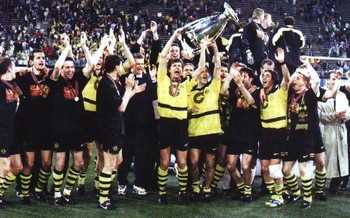 Bayern Munich may be the dominant team in the annals of German footballing history, but in the mid-1990s, it was Borussia Dortmund—with their distinctive yellow uniforms—who ruled the roost, and, for one season, the world as well. Led by midfielders Matthias Sammer and Paul Lambert, Dortmund rolled through the Bundesliga, winning the domestic title with ease and adding the DFB Supercup in the process. Then, they weaved through the Champions League, defeating the mighty Juventus side led by Zinedine Zidane 3-1 in the final. As if that weren't enough, Dortmund continued their dominance in the Intercontinental Cup, blasting through the field with ease to become world champions. Their fortunes have faded in recent seasons, but fans still speak with awe about that glorious run in 1996-97 when they were kings of the world.
37. Everton, 1984-85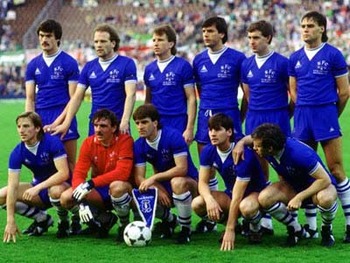 The Everton squads of the mid-1980s were one of the most underrated sides in football history, thanks to a general ban on English teams from European competition after the Heysel Disaster in 1985. However, before the ban was levied, the 1984-85 Blues side was able to make a historic run, capturing the First Division crown, as well as the Cup Winners' Cup in Europe, which remains the only international trophy the club has won to date. Managed by the superb Howard Kendall, Everton could have been a dominant force in European football had they not been banned. With Scottish forwards Andy Gray and Graeme Sharp, the other Merseyside squad had a strike force that was unmatched in England at the time. Their defense was stern, and Everton could have done great things in Europe. Sadly, by the time the ban was lifted, the Blues had disbanded, their best pieces scattered to the winds, including Kendall. Even so, the 1984-85 squad remains beloved by Everton fans the world over.
36. Penarol, 1960-61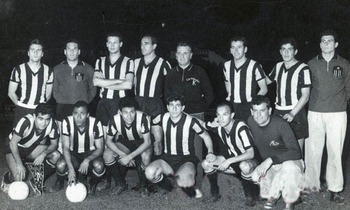 In the late 1950s and early 1960s, the South American football world was controlled by a select few clubs. One of them was Uruguayan giants Penarol. With their black and yellow kits, Penarol emerged as the dominant force in South American football during the 1960-61 season. They won the Uruguayan title with little difficulty, then took home the prestigious Champions Cup (the predecessor of the Copa de Libertadores), their second straight continental championship. As if that weren't enough, Penarol dismantled Benfica in the Intercontinental Cup final, avenging a loss to Real Madrid the year before and becoming world champions. Penarol has long been Uruguay's most successful club team, but with the likes of Luis Cubilla, Pedro Rocha, Alberto Spencer and Juan Joya, the 1960-61 side is remembered most fondly by the team's rabid fans.
35. Barcelona, 2005-06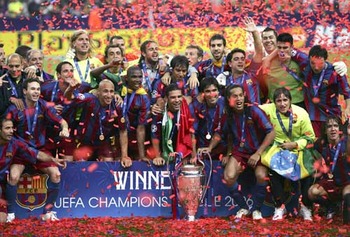 The 2005-06 Barcelona team was among the most dominant sides in recent memory, thanks to a potent attack spearheaded by Samuel Eto'o and his 34 goals and the stellar skills of Ronaldinho at the height of his powers. But Barca had some steak with that sizzle, with a formidable defense anchored by Carlos Puyol. The Catalan side blasted through La Liga, winning the title by 12 points over Real Madrid's Galacticos. They also netted the Supercopa de Espana domestically and achieved the treble with a Champions League trophy, beating Arsenal in the final, 2-1. While this team may lack some of the talent of the current squad, their trophy haul and dominance in La Liga puts them higher up the list.
34. Preston North End, 1888-89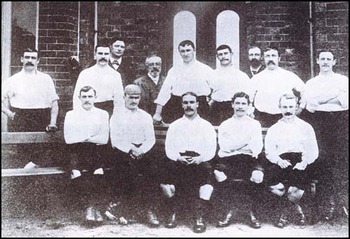 Shocked to see a team from such a bygone era anywhere on this list? Don't be; this Preston North End squad may have been one of the most dominant teams in history. Led by John Goodall and Fred Dewhurst, North End blew through the inaugural Football League season like they were the only teams in it, allowing all of 15 goals in 22 games, when no other club allowed fewer than 37. They also controlled the FA Cup, failing to lose a game or concede a goal in the tournament, something even the dominant Arsenal squad of 2003-04 could not claim.
33. River Plate, 1940s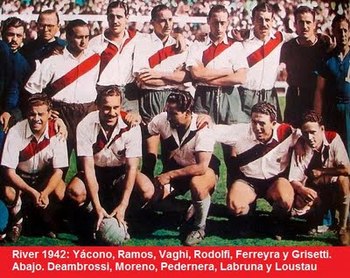 The 1940s and 1950s in Argentine football could be summed up in two words: River Plate. While the '50s edition of the team was dominant, the one that fans still talk about and venerate above all others are "La Machina," the unstoppable force of the 1940s. Featuring a unique five-forward line, and playing a brand of football similar to the Dutch "Total Football" from the 1970s, Plate took home numerous titles with their attacking style of football. The names of Plate's forwards remain legendary today, as Juan Carlos Munoz, Jose Manuel Moreno, Adolfo Pedernera, Angel Amadeo Labruna, Felix Lostau, and, for a time, Alfredo di Stefano, became known as Los Caballeros de Anguista (The Knights of Anguish) for their penchant of running a knife through opponents hopes near the end of matches. Suffice it to say that when you have two nicknames for your dominance, you deserve a spot on this list.
32. Manchester United, 1968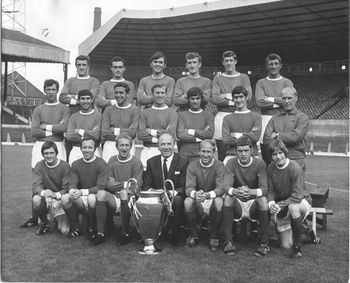 In 1958, a British Airways plane carrying a promising young Manchester United squad from Yugoslavia to Munich-Riem airport crashed on a slushy runway, killing eight players and decimating the squad's hopes for the foreseeable future. In 1968, led by flight survivors Bobby Charlton and manager Matt Busby, the Red Devils finally reached their potential, winning the European Cup 4-1 over Benfica. Led by superstar forward George Best, and a slew of talented forwards, the team is viewed as one of the best in Old Trafford's lengthy history, although they failed to win the Football League title, finishing second to Manchester City. Even so, the poignancy of becoming the first English side to win the European title, so soon after the devastating crash, put United on the list.
31. Tottenham Hotspur, 1960-61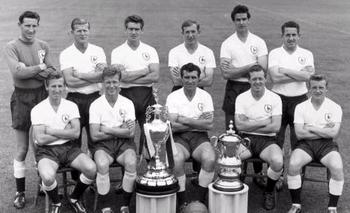 The Tottenham Hotspur side of 1960-61 are still renowned by fans at White Hart Lane to this day, but to the rest of the world, they've largely been forgotten, which is a shame. Led by the dynamic duo of strikers Robert Smith, who racked up 33 goals, Les Allen, who tallied 26, and Welsh winger Cliff Jones' 20 goals, Spurs were an offensive juggernaut, netting 115 goals on the year, en route to the Football League crown, as well as the FA Cup title. Big deal, you say. Lots of teams have won the domestic double. Perhaps, but few have done it as convincingly as Tottenham, and the North London club were the first team to do it since 1896-97, when Aston Villa accomplished the feat. If that doesn't scream dominance, I don't know what does.
30. Red Star Belgrade, 1991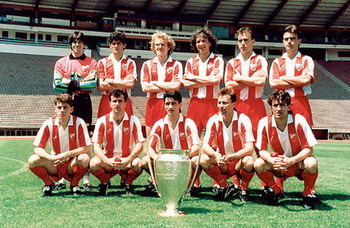 This Serbian side was the cream of the Eastern European crop in the late 1980's and the very early 1990's, reaching their apex during the 1990-91 season. Red Star won their league title with ease, as they faced little competition. Their sights were set on bigger and better things, namely: Europe. Led by forward Darko Pancev, midfielders Robert Prosinecki, Dejan Savicevic, and goalkeeper Stevan Stojanovic, Red Star charged into the European Cup finals against Olympique Marseilles, and emerged victorious through a shootout. They went on to win the Intercontinental Cup, and became world champs. However, by the next season, the war in Yugoslavia saw the team dismantled, spread across the Serbian footballing landscape. While Red Star eventually returned to prominence, they never again managed the success that they achieved in the early 90's.
29. AC Milan, 1993-94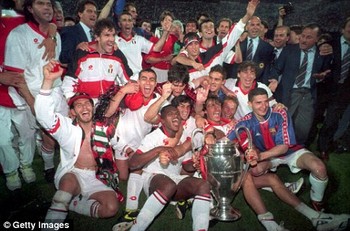 The 1993-94 Milan squad represents the pinnacle of defensive fortitude, thanks to the guidance of manager Fabio Capello. Milan rolled through Serie A despite scoring all of 36 goals in 34 games, allowing just 15 on the year. They also took home the Supercopa Italiana, the equivalent of the Carling Cup in England. To top it all off, Capello's iron-clad squad routed Barcelona in the Champions League final, using an offensive explosion to secure a 3-1 win, and the glory of the treble. On a team devoid of superstars, it's tough to pick out a real leader, but rest assured that this team can contend with any on this list, mostly because no one would score on them.
28. Ajax, 1994-95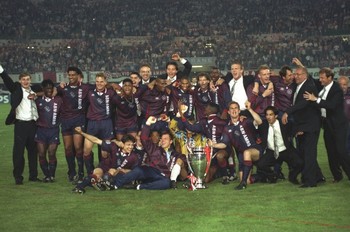 From Milan's defensive style in 1994 to the freewheeling Dutch side Ajax in 1995, you couldn't come up with two teams who had more differing styles of play. Ajax was all about the offense, using their youthful talents to full effect throughout the Champions League and the Dutch Eredivisie, ultimately winning both. Led by the likes of Frank de Boer and Frank Rijkaard in defense, and Patrick Kluivert, Jari Litmanen and Ronald de Boer on the attack, Ajax are remembered as one of the most fun, exciting champions of Europe. They continued their dominance in the Intercontinental Cup, wowing crowds with their stellar play, en route to the international treble. 42. Dynamo Kiev, 1986 Dynamo Kiev have long been the dominant force in Ukranian football, but in the 1970s and 80s, they were the dominant force in all of Soviet football, ruling the league. Under the tutelage of legendary manager Valeriy Lobanovskyi, Kiev took home the European Cup Winners' Cup in 1986 and finished second in the European Super Cup to Steaua Bucharest. Led by the superb Oleg Blokhin, Kiev were the dominant force in football in the Soviet Bloc during this era, and while the 1875 edition was more successful, the 1986 team is typically considered the more superior unit. 41. Arsenal, 2003-04 No team in the modern era of football has found more success in domestic competition than the 2003-04 Arsenal side that ran roughshod over the English Premier League. Led by manager Arsene Wenger, the Gunners finished the season undefeated, the first side since Preston North End in 1889 to accomplish such a feat in English football. With a dynamic attack featuring forwards Dennis Bergkamp and Thierry Henry (Robin van Persie and Cesc Fabregas were a part of the squad, but didn't play a match for Arsenal) and aided by the likes of Patrick Viera, Freddy Ljundberg, Gilberto and Robert Pires in the midfield, the Gunners attack was as formidable as it is today. The difference is the Gunners had a defense worthy of their elite attack. Led by Ashley Cole, Sol Campbell and Kolo Toure, and anchored by Jens Lehmann, Arsenal's back line was as sturdy as they come. There weren't many trophies at Emirates Stadium that season, as the Gunners fell to Chelsea in the Champion's League quarterfinals, to Manchester United in the FA Cup semis and fell in the Carling Cup semis as well. Even so, with the dominance of their domestic season, the Gunners more than merit a spot on the list. 40. Bayern Munich, 2001 Coming into the 2000-01 campaign, much was expected of Bayern Munich. After all, they had won two straight Bundesliga titles, but had failed to translate that into any success on the international level, falling in the Champions League each time. However, Bayern would break through that season, taking the Bundesliga title and eventually wrapping up their first Champions League title in 25 years, ending their international drought in the process. Anchored by venerable keeper Oliver Kahn (who was old enough to have played in their last European success), Munich used a relentless attack powered by the likes of Giovane Elber, Carston Jancker, Roque Santa Cruz and Mehmet Scholl to overwhelm opponents, confident in the knowledge that Kahn had their back. As if this weren't enough, Bayern would roll through the Intercontinental Cup as well, cementing their status as the world's best team. 39. Real Madrid, 1957-58 From 1955-1960, Real Madrid were the unquestioned champions of Europe. They ran roughshod over all foes, led by the great Alfredo Di Stefano and Hungarian legend Ferenc Puskas. In 1957-58, Real were at the height of their powers and took home their third straight European Cup with ease, remaining the only team to win the tournament since it's inception three years earlier. Powered by Di Stefano's sublime play, Madrid ascended to rarefied air this season, which explains why they make the cut over earlier seasons. 38. Borussia Dortmund, 1996-97 Bayern Munich may be the dominant team in the annals of German footballing history, but in the mid-1990s, it was Borussia Dortmund—with their distinctive yellow uniforms—who ruled the roost, and, for one season, the world as well. Led by midfielders Matthias Sammer and Paul Lambert, Dortmund rolled through the Bundesliga, winning the domestic title with ease and adding the DFB Supercup in the process. Then, they weaved through the Champions League, defeating the mighty Juventus side led by Zinedine Zidane 3-1 in the final. As if that weren't enough, Dortmund continued their dominance in the Intercontinental Cup, blasting through the field with ease to become world champions. Their fortunes have faded in recent seasons, but fans still speak with awe about that glorious run in 1996-97 when they were kings of the world. 37. Everton, 1984-85 The Everton squads of the mid-1980s were one of the most underrated sides in football history, thanks to a general ban on English teams from European competition after the Heysel Disaster in 1985. However, before the ban was levied, the 1984-85 Blues side was able to make a historic run, capturing the First Division crown, as well as the Cup Winners' Cup in Europe, which remains the only international trophy the club has won to date. Managed by the superb Howard Kendall, Everton could have been a dominant force in European football had they not been banned. With Scottish forwards Andy Gray and Graeme Sharp, the other Merseyside squad had a strike force that was unmatched in England at the time. Their defense was stern, and Everton could have done great things in Europe. Sadly, by the time the ban was lifted, the Blues had disbanded, their best pieces scattered to the winds, including Kendall. Even so, the 1984-85 squad remains beloved by Everton fans the world over. 36. Penarol, 1960-61 In the late 1950s and early 1960s, the South American football world was controlled by a select few clubs. One of them was Uruguayan giants Penarol. With their black and yellow kits, Penarol emerged as the dominant force in South American football during the 1960-61 season. They won the Uruguayan title with little difficulty, then took home the prestigious Champions Cup (the predecessor of the Copa de Libertadores), their second straight continental championship. As if that weren't enough, Penarol dismantled Benfica in the Intercontinental Cup final, avenging a loss to Real Madrid the year before and becoming world champions. Penarol has long been Uruguay's most successful club team, but with the likes of Luis Cubilla, Pedro Rocha, Alberto Spencer and Juan Joya, the 1960-61 side is remembered most fondly by the team's rabid fans. 35. Barcelona, 2005-06 The 2005-06 Barcelona team was among the most dominant sides in recent memory, thanks to a potent attack spearheaded by Samuel Eto'o and his 34 goals and the stellar skills of Ronaldinho at the height of his powers. But Barca had some steak with that sizzle, with a formidable defense anchored by Carlos Puyol. The Catalan side blasted through La Liga, winning the title by 12 points over Real Madrid's Galacticos. They also netted the Supercopa de Espana domestically and achieved the treble with a Champions League trophy, beating Arsenal in the final, 2-1. While this team may lack some of the talent of the current squad, their trophy haul and dominance in La Liga puts them higher up the list. 34. Preston North End, 1888-89 Shocked to see a team from such a bygone era anywhere on this list? Don't be; this Preston North End squad may have been one of the most dominant teams in history. Led by John Goodall and Fred Dewhurst, North End blew through the inaugural Football League season like they were the only teams in it, allowing all of 15 goals in 22 games, when no other club allowed fewer than 37. They also controlled the FA Cup, failing to lose a game or concede a goal in the tournament, something even the dominant Arsenal squad of 2003-04 could not claim. 33. River Plate, 1940s The 1940s and 1950s in Argentine football could be summed up in two words: River Plate. While the '50s edition of the team was dominant, the one that fans still talk about and venerate above all others are "La Machina," the unstoppable force of the 1940s. Featuring a unique five-forward line, and playing a brand of football similar to the Dutch "Total Football" from the 1970s, Plate took home numerous titles with their attacking style of football. The names of Plate's forwards remain legendary today, as Juan Carlos Munoz, Jose Manuel Moreno, Adolfo Pedernera, Angel Amadeo Labruna, Felix Lostau, and, for a time, Alfredo di Stefano, became known as Los Caballeros de Anguista (The Knights of Anguish) for their penchant of running a knife through opponents hopes near the end of matches. Suffice it to say that when you have two nicknames for your dominance, you deserve a spot on this list. 32. Manchester United, 1968 In 1958, a British Airways plane carrying a promising young Manchester United squad from Yugoslavia to Munich-Riem airport crashed on a slushy runway, killing eight players and decimating the squad's hopes for the foreseeable future. In 1968, led by flight survivors Bobby Charlton and manager Matt Busby, the Red Devils finally reached their potential, winning the European Cup 4-1 over Benfica. Led by superstar forward George Best, and a slew of talented forwards, the team is viewed as one of the best in Old Trafford's lengthy history, although they failed to win the Football League title, finishing second to Manchester City. Even so, the poignancy of becoming the first English side to win the European title, so soon after the devastating crash, put United on the list. 31. Tottenham Hotspur, 1960-61 The Tottenham Hotspur side of 1960-61 are still renowned by fans at White Hart Lane to this day, but to the rest of the world, they've largely been forgotten, which is a shame. Led by the dynamic duo of strikers Robert Smith, who racked up 33 goals, Les Allen, who tallied 26, and Welsh winger Cliff Jones' 20 goals, Spurs were an offensive juggernaut, netting 115 goals on the year, en route to the Football League crown, as well as the FA Cup title. Big deal, you say. Lots of teams have won the domestic double. Perhaps, but few have done it as convincingly as Tottenham, and the North London club were the first team to do it since 1896-97, when Aston Villa accomplished the feat. If that doesn't scream dominance, I don't know what does. 30. Red Star Belgrade, 1991 This Serbian side was the cream of the Eastern European crop in the late 1980's and the very early 1990's, reaching their apex during the 1990-91 season. Red Star won their league title with ease, as they faced little competition. Their sights were set on bigger and better things, namely: Europe. Led by forward Darko Pancev, midfielders Robert Prosinecki, Dejan Savicevic, and goalkeeper Stevan Stojanovic, Red Star charged into the European Cup finals against Olympique Marseilles, and emerged victorious through a shootout. They went on to win the Intercontinental Cup, and became world champs. However, by the next season, the war in Yugoslavia saw the team dismantled, spread across the Serbian footballing landscape. While Red Star eventually returned to prominence, they never again managed the success that they achieved in the early 90's. 29. AC Milan, 1993-94 The 1993-94 Milan squad represents the pinnacle of defensive fortitude, thanks to the guidance of manager Fabio Capello. Milan rolled through Serie A despite scoring all of 36 goals in 34 games, allowing just 15 on the year. They also took home the Supercopa Italiana, the equivalent of the Carling Cup in England. To top it all off, Capello's iron-clad squad routed Barcelona in the Champions League final, using an offensive explosion to secure a 3-1 win, and the glory of the treble. On a team devoid of superstars, it's tough to pick out a real leader, but rest assured that this team can contend with any on this list, mostly because no one would score on them. 28. Ajax, 1994-95 From Milan's defensive style in 1994 to the freewheeling Dutch side Ajax in 1995, you couldn't come up with two teams who had more differing styles of play. Ajax was all about the offense, using their youthful talents to full effect throughout the Champions League and the Dutch Eredivisie, ultimately winning both. Led by the likes of Frank de Boer and Frank Rijkaard in defense, and Patrick Kluivert, Jari Litmanen and Ronald de Boer on the attack, Ajax are remembered as one of the most fun, exciting champions of Europe. They continued their dominance in the Intercontinental Cup, wowing crowds with their stellar play, en route to the international treble. 27. Flamengo, 1981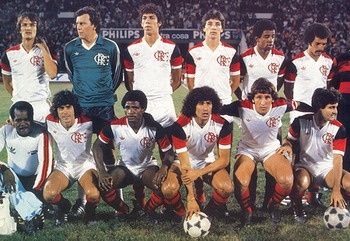 Brazilian club Flamengo rose to prominence out of the chaos that is the Brazilian club football scene in the mid-to-late 1970s. Once they got to the top, the club decided to stay away, reaching the peak of their powers during the 1981 season. Led by the likes of Zico, Tita, Claudio Adao, Junior, Adilo, and Carpegiani, Flamengo dominated the Brazilian League, becoming national champions, and took home thet Copa de Libertadores, crowning them as South American champs and earning the thrilling club the right to play in the Intercontinental Cup. Once there, they ran rampant, blowing out Liverpool 3-0 in the final, thanks to two goals from Nunes, a third from Adilo, and a performance for the ages from Zico. This was one of the most talented teams in history, and they're still looked upon by many Brazilian fans as one of the pinnacles of the game at it's finest. 26. Inter Milan 2009-10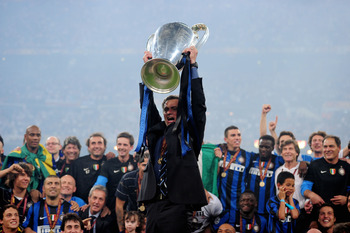 Shaun Botterill/Getty Images Italian soccer is best defined by it's periods of dominance from one team, and over the last five years, no club has been more dominant than Internazionale Milan. Last season, Inter hit their peak, blasting through Serie A for their fifth straight title, snagged the Coppa Italia, and finished just short of a domestic treble with a loss in the SuperCup finals against Lazio. However, they made up for it with a surprising Champions League triumph, giving manager Jose Mourinho his second European title. With one of the best keepers in the world in Julio Cesar, a power-packed offense led by Diego Milito, Samuel Eto'o and Wesley Sneijder, and a sturdy defense, Inter was the class of the continent last season. With a victory in the Club World Cup, Inter became world champions for the first time in their history, and capped off one of the most impressive runs in recent memory. 25. Juventus, 1995-97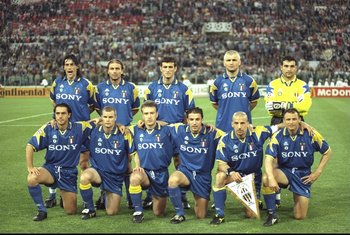 Shaun Botterill/Getty Images What to make of the Marcello Lippi managed Juventus squads of the mid 1990s has been one of the most baffling questions to football fans the world over. Juve won the Champions League in 1995-96, as well as netting the SuperCopa Italiana. But they finished second in Serie A, and failed to advance past the round of 16 in the Coppa Italia. The 1996-97 team is considered to be one of the greatest squads ever assembled, winning the Scudetto domestically (the Serie A title), along with the UEFA Super Cup, pitting the Champions League winner against the UEFA Cup winner and the Intercontinental Cup. However, they fell to Borussia Dortmund in the Champions League finals, despite possessing players like Zinedine Zidane and a fully charged Alessandro Del Piero, who was a revelation for Juventus. So, we'll combine the two squads, giving us one of the world's best squads for two seasons, even if they couldn't put it all together to win everything in one try. 24. Liverpool, 1976-77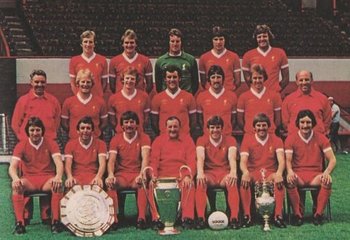 Under manager Bob Paisley, no one could touch Liverpool in 1976-77. Featuring sublime striker Kevin Keegan in his last full season at Anfield, goalkeeper Ray Clemence, striker Steve Heighway and midfielders Ray Kennedy and Jimmy Case, the Reds rolled through Division One for their second straight title. But, to that impressive haul, they added the European Cup, and the next season, they would find themselves with a second straight European title under their belt, thanks in large part to newcomers Graeme Souness and Kenny Dalglish. Liverpool of the late 1970's was a force, but in 1976-77, Anfield was unstoppable. 23. Porto, 2003-04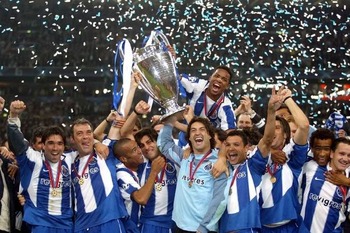 The Portuguese juggernauts FC Porto, one of the three giants of the Portuguese football world, reached the promised land in 2003-04, in a stunning run to the Champions League title to give them their second European crown in history. Led by a star-studded cast including such names as manager Jose Mourinho, Ricardo Carvalho, Deco, Jorge Costa, Paulo Ferreira, Pedro Mendes and Carlos Alberto, Porto escaped a near-elimination against Manchester United in the elimination stages, before beating Olympique du Lyonnais and Deportivo La Coruna en route to the final. Once there, they routed AS Monaco to take home the Champions League crown, to go along with the Portuguese Premier League title, and eventually, an Intercontinental Cup. Porto played a fun, exciting brand of football, and are still held in the pantheon of great teams in Portugal. 22. Bayern Munich, 1975-76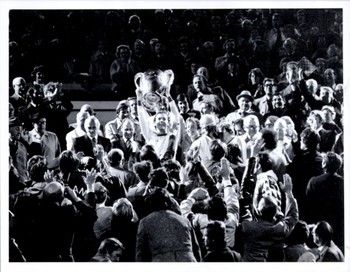 Sure, the Franz Beckenbauer-led Bayern Munich didn't win the Bundesliga in 1975-76. But, when it came to international competition, few teams stood much of a chance against them. With Franz "the Bull" Roth, and Gerd Muller doing most of the scoring, and Beckenbauer leading his troops from the back line with goalkeeper Sepp Maier, Bayern won their second straight European Cup, beating AS Saint-Etienne in the finals. But Bayern weren't done yet, heading to the Intercontinental Cup and demolishing Cruzeiro 2-0 to become World champs. While this might not be the best Bayern team of all time, given their domestic woes, the 1975-76 team was one of the most dominant in the club's history when going abroad. 21. Juventus, 1984-86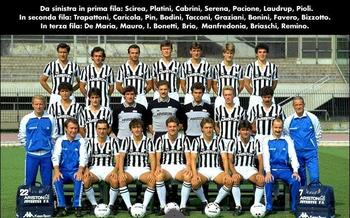 Yet another team who couldn't get it together for a one-season run at glory, Giovanni Trapattoni's Juventus squad of the mid-1980's was a force to be reckoned with. In 1984-85, they disappointed many fans in Serie A, with their sixth-place finish, and severe lack of domestic titles. However, the Italian giants snagged their first European Cup win, defeating Liverpool in a game better remembered for the stadium disaster that saw violence in the stands kill 39 people. The result was an indefinite ban from European competition for English clubs, while Juve would go on to dominate the Intercontinental Cup. The next season, the Torino club would find domestic success, dominating Serie A. So, when you put these talented teams, led by the dynamic Michel Platini together, you get one of the greatest sides of all time. 20. Real Madrid, 2001-03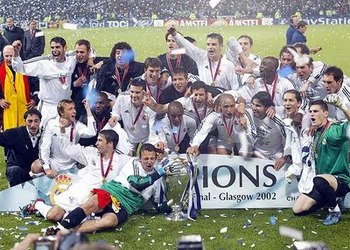 Much like Juventus of the mid 1990s, the Real Madrid squad of the early portion of the new millennium couldn't quite get their dominance in the domestic league and the international league going at the same time. In 2001-02, Madrid's Galacticos took home the Spanish Super Cup and the Champions League title, as well as qualifying for the Intercontinental Cup, which they won as part of the next season. However, they finished third in La Liga, and second in the Copa del Rey. In 2002-03, Real rectified their domestic futility, sprinting away with La Liga title and the UEFA Super Cup, while crashing out of the Champions League in the semifinals. With a cast of stars including Ronaldo (the fat one, not the Portuguese one), Zinedine Zidane, Raul and Luis Figo, Real were one of the best teams in the world. It's just a shame they couldn't get their act together to win La Liga and the Champions League in the same season. 19. Benfica, 1961-62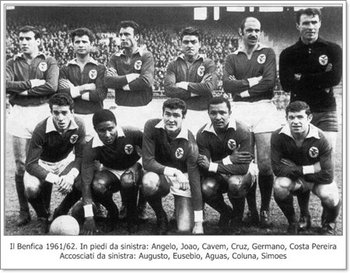 During the 1960's, one player and one team were able to successfully break Real Madrid's stranglehold on European competition: Eusebio and his Benfica squads of the early 1960's. Led by the incredibly talented Portuguese striker of Mozambiquan descent, Benfica had become the first team not named Real Madrid to win the European Cup in 1961, but they weren't done yet. Many thought the team had been fortunate to escape Barcelona in 1961, so when they prepared to take on a Real Madrid squad still featuring Ferenc Puskas, Alfredo di Stefano, and Luis del Sol in the 1962 European Cup finals, few thought they stood a chance. In the early going, di Stefano showed why many saw him as the world's best player, scoring a hat trick to put Real up 3-2. But, Eusebio wouldn't go down without a fight. After Marc Coluna tied things up, Benfica's star went into full-on supernova, blasting a pair of goals through to give Benfica a stunning 5-3 win, and their second straight European crown. They would wind up as runner ups in the International Cup, but the Portuguese side's legacy had been secured. 18. Millonarios 1950-54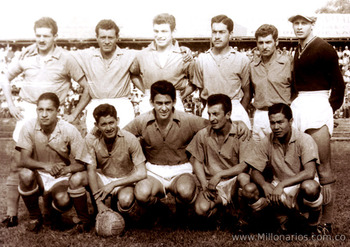 In the late 1940s, Colombia's economy was booming, and much of that money wound up being poured into the country's football league, particularly the Bogota based club Millonarios. When FIFA protested the team's free spending ways and revoked their sanction, that didn't stop them from buying up all of the best talent they could find, most notably Alfredo di Stefano, Adolfo Pedernera and Nestor Rossi, forming "La Ballet Azul". For four years, from 1950 until 1954, Millonarios ruled the football world. Everyone wanted a piece, shirking FIFA's sanctions and playing the juggernaut anyway. Typically, La Ballet Azul were victorious, and became one of the most famous clubs in the world. But, the cash dried up in 1954, as Colombia descended into political turmoil, the party ended. FIFA granted the team a year to impress the world, which they happily did, but the glory days of Millonarios ended as abruptly as they had begun, as all of their foreign talent departed to more lucrative shores. 17. Manchester United, 1957-58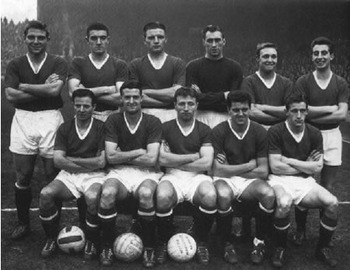 Few teams on Earth had as much potential for glory as the 1957-58 Manchester United squad, known affectionately as "Busby's Babes". Manager Matt Busby had used the Red Devils' youth program to full extent, and with a dominant club, the results were going to come to fruition soon. From promising strikers Bobby Charlton and Dennis Viollet, to goalkeepers Ray Wood and Harry Gregg, this young team looked to dominate Europe for years to come. But that all changed one fateful night in February 1958, when the plane they were in crashed on a Munich runway covered in slush. Eight players were killed, while most of the rest of the team suffered serious injuries. Busby himself had last rites read to him twice during the ensuing days, while several young players, including Johnny Berry and Jackie Blanchflower either never played again, or were never the same again. While Busby's Babes never reached their potential, this talented team more than merits a spot on this list. 16. AC Milan, 1990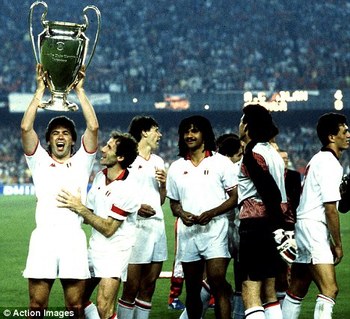 From 1988 through 1990, AC Milan were the team in Italy, and possibly in the entire world. Known as "Gli Immortali" (The Immortals), Milan found themselves at the peak of their dominance in 1989-90, blasting through Serie A and the European Cup for the second consecutive season. They also took home the Intercontinental Cup for the second straight season, crowning themselves as one of the greatest teams the world has ever known. Led by forwards Marco van Baasten and Ruud Gullit, midfielders Frank Rijkaard, Marco Donadoni and Carlo Ancelotti, and they typical Milan defense, few could stop them as they embarked on a run of unprecedented success. 15. Barcelona, 2010-11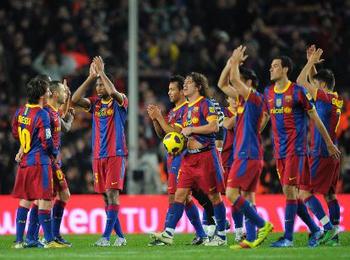 I realize this season is far from over for Barca, but if results so far are any indication, we're dealing with a team angling to make history. They've lost all of one La Liga match all season, and sit a comfortable five points clear of second-place Real Madrid. They've allowed a total of 15 goals in La Liga this season, and their plus-66 goal differential is one of the greatest of all time. Barca is rolling through the Champions League, rallying to dispatch Arsenal in the round of 16, with a fairly soft quarterfinal clash against Shaktar Donetsk on tap next. They've reached the finals of the Copa Del Rey, set to kick off April 20 against Real Madrid. Led by the sublime talents of Lionel Messi, David Villa and Pedro on the front line, a midfield laden with an unprecedented amount of talent (Xavi, Andres Iniesta, and Sergio), and a staunch defense anchored by Carlos Puyol, Gerard Pique, Eric Abidal, and Dani Alves, with keeper Victor Valdes at the back, Barca could be one of the most talented teams in history. All that's left is picking up some hard-earned hardware, which the Catalans seem poised to do with relative ease. Granted, if they collapse down the stretch and come away empty handed, they lose their top-team status. But, with three candidates for FIFA's Player of the Year, including the eventual winner, this year's Barca squad is as talented as anyone on this list, if not moreso. 14. Nottingham Forest, 1978-79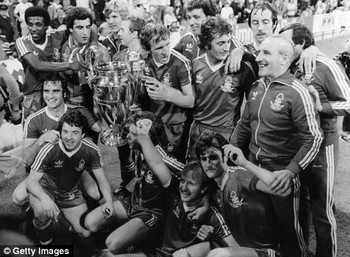 When Brian Clough took over tiny English Club Nottingham Forest, few could have anticipated the kind of run he would lead the team on. From promotion to the First Division in 1976-77, Clough promptly led Forest to the 1977-78 League title, thereby taking a berth in the European Cup. The next season's First Division crown would be taken by Liverpool, but more or less every other conceivable trophy was won by Forest, as they shot through the League Cup, European Cup, European Super Cup, and Community Shield. They would repeat as European Cup champions in 1979-80, while adding a second-place finish in the Intercontinental Cup. Forest featured some prominent players from the era, including goalkeeper Peter Shilton, striker Trevor Francis, and Scottish internationals in winger John Robertson, midfielder Archie Gemmill and defender Kenny Burns. While they never had the star power of other clubs, Forest were one of the dominant forces in European football during the late 1970's. 13. Real Madrid, 1998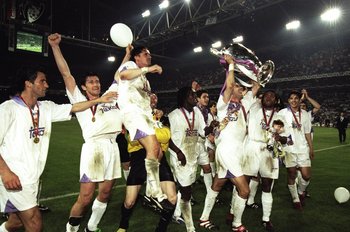 Clive Brunskill/Getty Images In 1997-98 Real Madrid would end the season as European champions, thanks to a star-studded cast of characters, including Clarence Seedorf, Christian Panucci, Roberto Carlos and Raul. They rolled through the Champions League that season delivering the club's seventh European title, and ultimately won the Intercontinental Cup as well, establishing themselves as the best team in the world. While Madrid struggled in La Liga, few teams can claim to match their dominance in international competition, particularly during the 1997-98 season. 12. Glasgow Celtic, 1966-67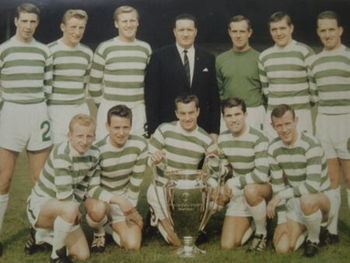 "The Lisbon Lions" as this team is affectionately known, are the most successful side in the history of Scottish football, which is no small feat. The 1966-67 Celtic side ran away with the Scottish League title, the Scottish Cup and the Scottish League Cup, but they had their sights set higher. Coached by Jock Stein and featuring a five-man front line, Celtic played a fast-paced, wide-open style that was fun to watch and as aesthetically pleasing as they come. However, they faced a stern challenge in defensively minded Inter Milan in the European Cup finals in Lisbon, a team favored to take the title. However, thanks to a pair of goals from Tommy Gemmell and Steve Chalmers in the final half-hour of the match, the Scottish side became the first British team to win a European championship, and remain one of two Scottish sides to win a European title (Rangers, the other dominant force in Scottish football, took home the 1972 Cup Winners' Cup). 11. Manchester United, 2007-08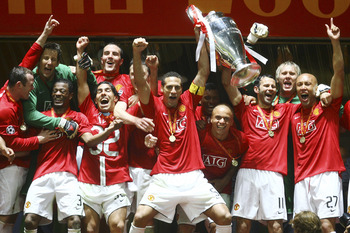 Julian Finney/Getty Images In 2007-08, the Premiership race came down to two teams: Manchester United and Chelsea. The Red Devils, led by an unprecedented offensive force featuring Carlos Tevez, Cristiano Ronaldo and Wayne Rooney, Manchester United snagged the EPL title on the last day of the season. They finished second in both the FA and League Cups, but helped ease that pain with a thrilling victory over Chelsea in the Champions League final, to give Old Trafford another European crown. They went on to snag world champion distinctions in the Club World Cup, and would ultimately be seen as one of the greatest, deepest United teams in history. 10. Barcelona 1991-92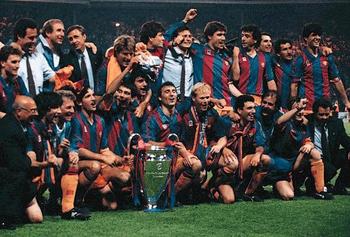 In 1988, former Barcelona standout Johan Cruyff returned to the Nou Camp to become the team's manager. He immediately set about putting together a "Dream Team", featuring some of the best talent the world had to offer. From Spaniards Pep Guardiola, Txiki Begiristain and Jose Mari Bakero to international superstars like Ronald Koeman, Romario and Michael Laudrup, few teams were as stacked as the Cruyff Barca squads of the early 90's, but none were more dominant than the 1991-92 installment. With it's second consecutive La Liga title wrapped up, Barca went on to take home the European Cup, UEFA Super Cup, Spanish Super Cup, and an Intercontinental Cup during the same season. Few teams have ever ruled with such control as the Catalan side did in 1991-92, and it's clear why Cruyff was the longest tenured manager in club history, lasting eight seasons before getting fired. 9. Santos, 1962-63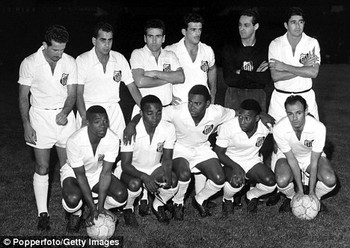 Few teams in the history of the sport can boast the kind of talent featured by Brazilian side Santos in the 1960s. They featured names like Pele, Pepe and Coutinho, and tore off a chunk of unprecedented world dominance, peaking in 1962-63. Fresh off a sweep of potential trophies in 1961-62, including a Copa de Libertadores and an Intercontinental Cup, Santos did it again in 62-63, blasting to a Brazilian national title, Copa de Libertadores, and Intercontinental Cup with ease. It is said that the great Real Madrid clubs of the era played Santos once, and escaped with a draw. After that, Real's legendary owner/president/manager, Santiago Bernabeu, declared that Real would never play Santos again, not even in their massive Estadio Bernabeu. Apocryphal or not, I think that tells you just how frighteningly good this team was. 8. Torino, 1946-47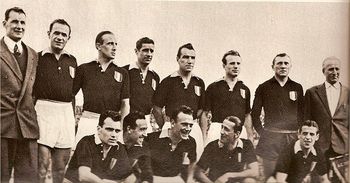 In the 1940s, few teams dominated their football landscapes the way Torino F.C. controlled Italian football. Known as "Il Grande Torino", the northern Italian team featured the biggest names in Italian football at the time, including goalkeeper Valerio Bacigalupo, Aldo Ballarin, Virgillo Maroso, Eusebio Castigliano, Romeo Mento, Valentino Mazzola, Franco Ossola and Guglielmo Gabetto. Typically either 10 Torino players, and on occasion, all 11 players, started for the Italian national team, and it was clear that Torino was a force to be reckoned with. In May of 1949, the Italian national team (essentially Torino, remember?) was heading from Hungary to Torino following a friendly with Hungary, when the jet they were flying in crashed into the base of the Superga basilica, just outside of Torino, killing everyone aboard. The club, devastated by the loss of it's stars, was never the same again. But Italian fans speak in reverent tones about this side, widely believed to be one of the best in Italian history. 7. Real Madrid, 1959-60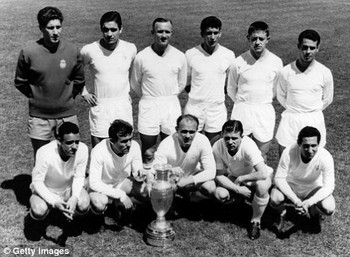 The last year of Real's dominance of Europe was also one of their greatest seasons of all time. With the same cast of Ferenc Puskas, Alfredo di Stefano, Jose Santamaria, and Luis del Sol running the show, Madrid swept through almost every conceivable league and continental title, beating Eintracht Frankfurt 7-3 in the European Cup final, and nearly taking the Copa Del Rey, finishing second. But, this time, Real didn't stop with Europe, blasting their way through Uruguay's Penarol to win their first Intercontinental Cup. This was Madrid at their peak, when they seemed most unbeatable, which is why they're so much higher on the list than any other Real squad. 6. Liverpool, 1983-84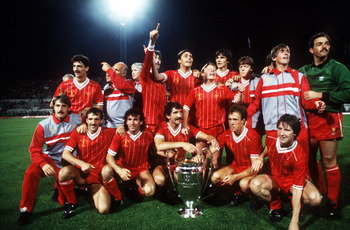 Getty Images/Getty Images Under manager Bob Paisley, Liverpool had become one of the most powerful teams in Europe, but heading into the 1983-84 season, Paisley was gone, replaced by assistant Joe Fagan. Not that it mattered much, as the talented Reds embarked on one of their most glorious seasons ever. They netted the League Cup in December, the Football League title in May, and finally, scored a European Cup victory in June, etching their names in the history books. With names like Kenny Dalglish, Graeme Souness, Craig Johnston, Ian Rush, Ronnie Whelan, Sammy Lee, and possibly insane goalkeeper Bruce Grobbelaar backstopping a formidable Anfield defense, it's clear why this Liverpool squad is looked at as one of the greatest ever to take the pitch. 5. Ajax, 1971-72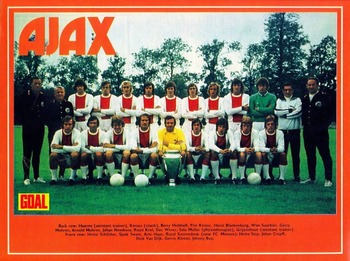 In the late 1960s and early 1970s, the Dutch style of "total football" became all the rage, and no team better embodied the concept than Ajax. The Dutch juggernauts were captained by the indomitable Johan Cruyff, whose skills in the midfield were unmatched. In 1972, Ajax hit the peak of dominance, achieving a true treble by winning the Eredivisie, KNVB Cup and European Cup. Led by Cruyff and national team stars like Dick van Dijk, Ruud Krol, Gerrie Muhren, Nico Rijnders, and Heinz Stuy, the club added an Intercontinental Cup, and looked unbeatable. But, then, like all great things, it came to an abrupt end in 1973-74. Cruyff headed to Barcelona, signalling the end of "Total Football" at Ajax, and in 1974, they fell to CSKA Sofia in the European Cup. Even so, the 1971-72 installment of Ajax remains one of the most famous clubs in history, and with its combination of talent and titles, they deserve this spot. 4. Barcelona, 2008-09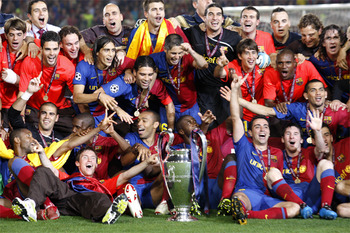 Few teams in the history of world football can claim the kind of dominance that Spanish side Barcelona flashed in 2008-09. With one of the most talented rosters in history, featuring Lionel Messi, Samuel Eto'o and Thierry Henry at forward, Xavi, Andres Iniesta and Yaya Toure at midfield, and Carles Puyol, Gerard Pique, Dani Alves and Eric Abidal at fullback, with Victor Valdes in goal, and the indomitable Pep Guardiola managing, it was almost a foregone conclusion that Barca would put together an unprecedented run of dominance, winning La Liga, the Copa del Rey, the Champions League, and, eventually, the Club Word Cup. With it's modernized version of "Total Football", the Catalan juggernaut wasn't just fun to watch, they were almost unstoppable, and have entered the annals of history as one of the top teams of all time. 3. Inter Milan, 1964-65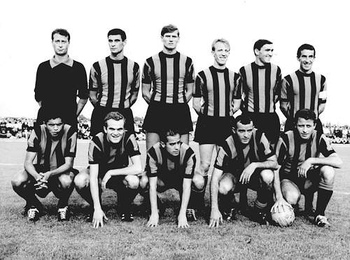 Good luck scoring on this bunch. Much like many of the greatest teams in Italian football history, the Inter Milan squad of 1964-65, managed by the legendary Helenio Herrera was renowned for their impenetrable defense. Led by captain Giacinto Facchetti, keeper Giuliano Sarti, sweeper Armando Picchi, and Tarcisio Burgnich, Inter won their second straight Serie A title, as well as their second straight European Cup, and their second straight world title. For three years, few could touch Inter, but in 1964-65, no one came close to the Italian club in terms of talent or skill, particularly defensively. 2. Bayern Munich, 1973-74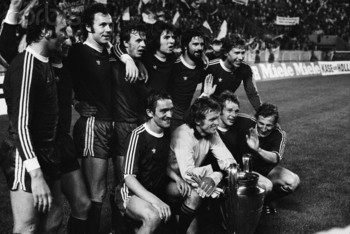 This was Bayern at their most unstoppable. In the midst of their run of dominance in the mid 1970's the 1973-74 season stands out because of just how dominant the German giants were. Beckenbauer was leading the charge from the defense, Uli Hoeneß and Gerd Muller were firing in goals, and Bayern were rolling like never before. What sets this team apart was it's dominance at home as well as abroad, as Bayern took the Bundesliga title, as well as the European Cup, winning both with relative ease. The Germans declined to participate in the Intercontinental Cup, denying them the chance for a world title, but even without one, this was without a doubt one of the greatest, deepest, most talented squads to ever grace a football pitch. 1. Manchester United, 1998-99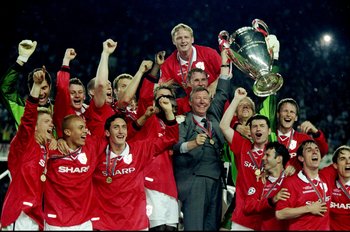 Phil Cole/Getty Images This is the team. The one who won it all, who did the unthinkable, who got Sir Alex Ferguson knighted. The 1998-1999 Red Devils were favored to win the Premiership that season, but few expected the kind of dominance we all got. From goalkeeper Peter Schmeichel, to a back line featuring Gary and Phil Neville, Jaap Stam and Dennis Irwin, through one of the greatest midfields of all time, featuring Roy Keane, Paul Scholes, Ryan Giggs, Nicky Butt, and some guy named David Beckham, all the way up to forwards Dwight Yorke, Andy Cole, Ole Gunnar Solskjaer, and Teddy Sheringham, it was hard to find many flaws at Old Trafford. When the dust settled, United had reached unprecedented territory: the treble, picking up the FA Cup, Premiership title and Champions League title. Let's break down why this was impressive; in order to win the Premiership, United needed 35 wins out of 38 games. On top of that, they had to play eight games in the FA Cup to win it, thanks to a pair of replays in the quarter and semifinals, all against the best league in the world. Finally, there was the Champions League, a grueling 13-game slog against the best teams Europe has to offer. That's 59 games over the course of a season. Typically, English clubs drop one of the three titles as a throwaway, to avoid playing such a brutal schedule, but not United. The next season, United grabbed an Intercontinental Cup win, and while they crashed out of FIFA's inaugural Club World Cup, that was more a product of fatigue and Ferguson not caring much about the event. For their unprecedented accomplishment, United are our greatest team in football history. Begin Slideshow
Keep Reading
27. Flamengo, 1981 Brazilian club Flamengo rose to prominence out of the chaos that is the Brazilian club football scene in the mid-to-late 1970s. Once they got to the top, the club decided to stay away, reaching the peak of their powers during the 1981 season. Led by the likes of Zico, Tita, Claudio Adao, Junior, Adilo, and Carpegiani, Flamengo dominated the Brazilian League, becoming national champions, and took home thet Copa de Libertadores, crowning them as South American champs and earning the thrilling club the right to play in the Intercontinental Cup. Once there, they ran rampant, blowing out Liverpool 3-0 in the final, thanks to two goals from Nunes, a third from Adilo, and a performance for the ages from Zico. This was one of the most talented teams in history, and they're still looked upon by many Brazilian fans as one of the pinnacles of the game at it's finest.
26. Inter Milan 2009-10 Shaun Botterill/Getty Images Italian soccer is best defined by it's periods of dominance from one team, and over the last five years, no club has been more dominant than Internazionale Milan. Last season, Inter hit their peak, blasting through Serie A for their fifth straight title, snagged the Coppa Italia, and finished just short of a domestic treble with a loss in the SuperCup finals against Lazio. However, they made up for it with a surprising Champions League triumph, giving manager Jose Mourinho his second European title. With one of the best keepers in the world in Julio Cesar, a power-packed offense led by Diego Milito, Samuel Eto'o and Wesley Sneijder, and a sturdy defense, Inter was the class of the continent last season. With a victory in the Club World Cup, Inter became world champions for the first time in their history, and capped off one of the most impressive runs in recent memory.
25. Juventus, 1995-97 Shaun Botterill/Getty Images What to make of the Marcello Lippi managed Juventus squads of the mid 1990s has been one of the most baffling questions to football fans the world over. Juve won the Champions League in 1995-96, as well as netting the SuperCopa Italiana. But they finished second in Serie A, and failed to advance past the round of 16 in the Coppa Italia. The 1996-97 team is considered to be one of the greatest squads ever assembled, winning the Scudetto domestically (the Serie A title), along with the UEFA Super Cup, pitting the Champions League winner against the UEFA Cup winner and the Intercontinental Cup. However, they fell to Borussia Dortmund in the Champions League finals, despite possessing players like Zinedine Zidane and a fully charged Alessandro Del Piero, who was a revelation for Juventus. So, we'll combine the two squads, giving us one of the world's best squads for two seasons, even if they couldn't put it all together to win everything in one try.
24. Liverpool, 1976-77 Under manager Bob Paisley, no one could touch Liverpool in 1976-77. Featuring sublime striker Kevin Keegan in his last full season at Anfield, goalkeeper Ray Clemence, striker Steve Heighway and midfielders Ray Kennedy and Jimmy Case, the Reds rolled through Division One for their second straight title. But, to that impressive haul, they added the European Cup, and the next season, they would find themselves with a second straight European title under their belt, thanks in large part to newcomers Graeme Souness and Kenny Dalglish. Liverpool of the late 1970's was a force, but in 1976-77, Anfield was unstoppable.
23. Porto, 2003-04 The Portuguese juggernauts FC Porto, one of the three giants of the Portuguese football world, reached the promised land in 2003-04, in a stunning run to the Champions League title to give them their second European crown in history. Led by a star-studded cast including such names as manager Jose Mourinho, Ricardo Carvalho, Deco, Jorge Costa, Paulo Ferreira, Pedro Mendes and Carlos Alberto, Porto escaped a near-elimination against Manchester United in the elimination stages, before beating Olympique du Lyonnais and Deportivo La Coruna en route to the final. Once there, they routed AS Monaco to take home the Champions League crown, to go along with the Portuguese Premier League title, and eventually, an Intercontinental Cup. Porto played a fun, exciting brand of football, and are still held in the pantheon of great teams in Portugal.
22. Bayern Munich, 1975-76 Sure, the Franz Beckenbauer-led Bayern Munich didn't win the Bundesliga in 1975-76. But, when it came to international competition, few teams stood much of a chance against them. With Franz "the Bull" Roth, and Gerd Muller doing most of the scoring, and Beckenbauer leading his troops from the back line with goalkeeper Sepp Maier, Bayern won their second straight European Cup, beating AS Saint-Etienne in the finals. But Bayern weren't done yet, heading to the Intercontinental Cup and demolishing Cruzeiro 2-0 to become World champs. While this might not be the best Bayern team of all time, given their domestic woes, the 1975-76 team was one of the most dominant in the club's history when going abroad.
21. Juventus, 1984-86 Yet another team who couldn't get it together for a one-season run at glory, Giovanni Trapattoni's Juventus squad of the mid-1980's was a force to be reckoned with. In 1984-85, they disappointed many fans in Serie A, with their sixth-place finish, and severe lack of domestic titles. However, the Italian giants snagged their first European Cup win, defeating Liverpool in a game better remembered for the stadium disaster that saw violence in the stands kill 39 people. The result was an indefinite ban from European competition for English clubs, while Juve would go on to dominate the Intercontinental Cup. The next season, the Torino club would find domestic success, dominating Serie A. So, when you put these talented teams, led by the dynamic Michel Platini together, you get one of the greatest sides of all time.
20. Real Madrid, 2001-03 Much like Juventus of the mid 1990s, the Real Madrid squad of the early portion of the new millennium couldn't quite get their dominance in the domestic league and the international league going at the same time. In 2001-02, Madrid's Galacticos took home the Spanish Super Cup and the Champions League title, as well as qualifying for the Intercontinental Cup, which they won as part of the next season. However, they finished third in La Liga, and second in the Copa del Rey. In 2002-03, Real rectified their domestic futility, sprinting away with La Liga title and the UEFA Super Cup, while crashing out of the Champions League in the semifinals. With a cast of stars including Ronaldo (the fat one, not the Portuguese one), Zinedine Zidane, Raul and Luis Figo, Real were one of the best teams in the world. It's just a shame they couldn't get their act together to win La Liga and the Champions League in the same season.
19. Benfica, 1961-62 During the 1960's, one player and one team were able to successfully break Real Madrid's stranglehold on European competition: Eusebio and his Benfica squads of the early 1960's. Led by the incredibly talented Portuguese striker of Mozambiquan descent, Benfica had become the first team not named Real Madrid to win the European Cup in 1961, but they weren't done yet. Many thought the team had been fortunate to escape Barcelona in 1961, so when they prepared to take on a Real Madrid squad still featuring Ferenc Puskas, Alfredo di Stefano, and Luis del Sol in the 1962 European Cup finals, few thought they stood a chance. In the early going, di Stefano showed why many saw him as the world's best player, scoring a hat trick to put Real up 3-2. But, Eusebio wouldn't go down without a fight. After Marc Coluna tied things up, Benfica's star went into full-on supernova, blasting a pair of goals through to give Benfica a stunning 5-3 win, and their second straight European crown. They would wind up as runner ups in the International Cup, but the Portuguese side's legacy had been secured. 18. Millonarios 1950-54 In the late 1940s, Colombia's economy was booming, and much of that money wound up being poured into the country's football league, particularly the Bogota based club Millonarios. When FIFA protested the team's free spending ways and revoked their sanction, that didn't stop them from buying up all of the best talent they could find, most notably Alfredo di Stefano, Adolfo Pedernera and Nestor Rossi, forming "La Ballet Azul". For four years, from 1950 until 1954, Millonarios ruled the football world. Everyone wanted a piece, shirking FIFA's sanctions and playing the juggernaut anyway. Typically, La Ballet Azul were victorious, and became one of the most famous clubs in the world. But, the cash dried up in 1954, as Colombia descended into political turmoil, the party ended. FIFA granted the team a year to impress the world, which they happily did, but the glory days of Millonarios ended as abruptly as they had begun, as all of their foreign talent departed to more lucrative shores. 17. Manchester United, 1957-58 Few teams on Earth had as much potential for glory as the 1957-58 Manchester United squad, known affectionately as "Busby's Babes". Manager Matt Busby had used the Red Devils' youth program to full extent, and with a dominant club, the results were going to come to fruition soon. From promising strikers Bobby Charlton and Dennis Viollet, to goalkeepers Ray Wood and Harry Gregg, this young team looked to dominate Europe for years to come. But that all changed one fateful night in February 1958, when the plane they were in crashed on a Munich runway covered in slush. Eight players were killed, while most of the rest of the team suffered serious injuries. Busby himself had last rites read to him twice during the ensuing days, while several young players, including Johnny Berry and Jackie Blanchflower either never played again, or were never the same again. While Busby's Babes never reached their potential, this talented team more than merits a spot on this list. 16. AC Milan, 1990 From 1988 through 1990, AC Milan were the team in Italy, and possibly in the entire world. Known as "Gli Immortali" (The Immortals), Milan found themselves at the peak of their dominance in 1989-90, blasting through Serie A and the European Cup for the second consecutive season. They also took home the Intercontinental Cup for the second straight season, crowning themselves as one of the greatest teams the world has ever known. Led by forwards Marco van Baasten and Ruud Gullit, midfielders Frank Rijkaard, Marco Donadoni and Carlo Ancelotti, and they typical Milan defense, few could stop them as they embarked on a run of unprecedented success. 15. Barcelona, 2010-11 I realize this season is far from over for Barca, but if results so far are any indication, we're dealing with a team angling to make history. They've lost all of one La Liga match all season, and sit a comfortable five points clear of second-place Real Madrid. They've allowed a total of 15 goals in La Liga this season, and their plus-66 goal differential is one of the greatest of all time. Barca is rolling through the Champions League, rallying to dispatch Arsenal in the round of 16, with a fairly soft quarterfinal clash against Shaktar Donetsk on tap next. They've reached the finals of the Copa Del Rey, set to kick off April 20 against Real Madrid. Led by the sublime talents of Lionel Messi, David Villa and Pedro on the front line, a midfield laden with an unprecedented amount of talent (Xavi, Andres Iniesta, and Sergio), and a staunch defense anchored by Carlos Puyol, Gerard Pique, Eric Abidal, and Dani Alves, with keeper Victor Valdes at the back, Barca could be one of the most talented teams in history. All that's left is picking up some hard-earned hardware, which the Catalans seem poised to do with relative ease. Granted, if they collapse down the stretch and come away empty handed, they lose their top-team status. But, with three candidates for FIFA's Player of the Year, including the eventual winner, this year's Barca squad is as talented as anyone on this list, if not moreso. 14. Nottingham Forest, 1978-79 When Brian Clough took over tiny English Club Nottingham Forest, few could have anticipated the kind of run he would lead the team on. From promotion to the First Division in 1976-77, Clough promptly led Forest to the 1977-78 League title, thereby taking a berth in the European Cup. The next season's First Division crown would be taken by Liverpool, but more or less every other conceivable trophy was won by Forest, as they shot through the League Cup, European Cup, European Super Cup, and Community Shield. They would repeat as European Cup champions in 1979-80, while adding a second-place finish in the Intercontinental Cup. Forest featured some prominent players from the era, including goalkeeper Peter Shilton, striker Trevor Francis, and Scottish internationals in winger John Robertson, midfielder Archie Gemmill and defender Kenny Burns. While they never had the star power of other clubs, Forest were one of the dominant forces in European football during the late 1970's. 13. Real Madrid, 1998 Clive Brunskill/Getty Images In 1997-98 Real Madrid would end the season as European champions, thanks to a star-studded cast of characters, including Clarence Seedorf, Christian Panucci, Roberto Carlos and Raul. They rolled through the Champions League that season delivering the club's seventh European title, and ultimately won the Intercontinental Cup as well, establishing themselves as the best team in the world. While Madrid struggled in La Liga, few teams can claim to match their dominance in international competition, particularly during the 1997-98 season. 12. Glasgow Celtic, 1966-67 "The Lisbon Lions" as this team is affectionately known, are the most successful side in the history of Scottish football, which is no small feat. The 1966-67 Celtic side ran away with the Scottish League title, the Scottish Cup and the Scottish League Cup, but they had their sights set higher. Coached by Jock Stein and featuring a five-man front line, Celtic played a fast-paced, wide-open style that was fun to watch and as aesthetically pleasing as they come. However, they faced a stern challenge in defensively minded Inter Milan in the European Cup finals in Lisbon, a team favored to take the title. However, thanks to a pair of goals from Tommy Gemmell and Steve Chalmers in the final half-hour of the match, the Scottish side became the first British team to win a European championship, and remain one of two Scottish sides to win a European title (Rangers, the other dominant force in Scottish football, took home the 1972 Cup Winners' Cup). 11. Manchester United, 2007-08 Julian Finney/Getty Images In 2007-08, the Premiership race came down to two teams: Manchester United and Chelsea. The Red Devils, led by an unprecedented offensive force featuring Carlos Tevez, Cristiano Ronaldo and Wayne Rooney, Manchester United snagged the EPL title on the last day of the season. They finished second in both the FA and League Cups, but helped ease that pain with a thrilling victory over Chelsea in the Champions League final, to give Old Trafford another European crown. They went on to snag world champion distinctions in the Club World Cup, and would ultimately be seen as one of the greatest, deepest United teams in history. 10. Barcelona 1991-92 In 1988, former Barcelona standout Johan Cruyff returned to the Nou Camp to become the team's manager. He immediately set about putting together a "Dream Team", featuring some of the best talent the world had to offer. From Spaniards Pep Guardiola, Txiki Begiristain and Jose Mari Bakero to international superstars like Ronald Koeman, Romario and Michael Laudrup, few teams were as stacked as the Cruyff Barca squads of the early 90's, but none were more dominant than the 1991-92 installment. With it's second consecutive La Liga title wrapped up, Barca went on to take home the European Cup, UEFA Super Cup, Spanish Super Cup, and an Intercontinental Cup during the same season. Few teams have ever ruled with such control as the Catalan side did in 1991-92, and it's clear why Cruyff was the longest tenured manager in club history, lasting eight seasons before getting fired. 9. Santos, 1962-63 Few teams in the history of the sport can boast the kind of talent featured by Brazilian side Santos in the 1960s. They featured names like Pele, Pepe and Coutinho, and tore off a chunk of unprecedented world dominance, peaking in 1962-63. Fresh off a sweep of potential trophies in 1961-62, including a Copa de Libertadores and an Intercontinental Cup, Santos did it again in 62-63, blasting to a Brazilian national title, Copa de Libertadores, and Intercontinental Cup with ease. It is said that the great Real Madrid clubs of the era played Santos once, and escaped with a draw. After that, Real's legendary owner/president/manager, Santiago Bernabeu, declared that Real would never play Santos again, not even in their massive Estadio Bernabeu. Apocryphal or not, I think that tells you just how frighteningly good this team was. 8. Torino, 1946-47 In the 1940s, few teams dominated their football landscapes the way Torino F.C. controlled Italian football. Known as "Il Grande Torino", the northern Italian team featured the biggest names in Italian football at the time, including goalkeeper Valerio Bacigalupo, Aldo Ballarin, Virgillo Maroso, Eusebio Castigliano, Romeo Mento, Valentino Mazzola, Franco Ossola and Guglielmo Gabetto. Typically either 10 Torino players, and on occasion, all 11 players, started for the Italian national team, and it was clear that Torino was a force to be reckoned with. In May of 1949, the Italian national team (essentially Torino, remember?) was heading from Hungary to Torino following a friendly with Hungary, when the jet they were flying in crashed into the base of the Superga basilica, just outside of Torino, killing everyone aboard. The club, devastated by the loss of it's stars, was never the same again. But Italian fans speak in reverent tones about this side, widely believed to be one of the best in Italian history. 7. Real Madrid, 1959-60 The last year of Real's dominance of Europe was also one of their greatest seasons of all time. With the same cast of Ferenc Puskas, Alfredo di Stefano, Jose Santamaria, and Luis del Sol running the show, Madrid swept through almost every conceivable league and continental title, beating Eintracht Frankfurt 7-3 in the European Cup final, and nearly taking the Copa Del Rey, finishing second. But, this time, Real didn't stop with Europe, blasting their way through Uruguay's Penarol to win their first Intercontinental Cup. This was Madrid at their peak, when they seemed most unbeatable, which is why they're so much higher on the list than any other Real squad. 6. Liverpool, 1983-84 Getty Images/Getty Images Under manager Bob Paisley, Liverpool had become one of the most powerful teams in Europe, but heading into the 1983-84 season, Paisley was gone, replaced by assistant Joe Fagan. Not that it mattered much, as the talented Reds embarked on one of their most glorious seasons ever. They netted the League Cup in December, the Football League title in May, and finally, scored a European Cup victory in June, etching their names in the history books. With names like Kenny Dalglish, Graeme Souness, Craig Johnston, Ian Rush, Ronnie Whelan, Sammy Lee, and possibly insane goalkeeper Bruce Grobbelaar backstopping a formidable Anfield defense, it's clear why this Liverpool squad is looked at as one of the greatest ever to take the pitch. 5. Ajax, 1971-72 In the late 1960s and early 1970s, the Dutch style of "total football" became all the rage, and no team better embodied the concept than Ajax. The Dutch juggernauts were captained by the indomitable Johan Cruyff, whose skills in the midfield were unmatched. In 1972, Ajax hit the peak of dominance, achieving a true treble by winning the Eredivisie, KNVB Cup and European Cup. Led by Cruyff and national team stars like Dick van Dijk, Ruud Krol, Gerrie Muhren, Nico Rijnders, and Heinz Stuy, the club added an Intercontinental Cup, and looked unbeatable. But, then, like all great things, it came to an abrupt end in 1973-74. Cruyff headed to Barcelona, signalling the end of "Total Football" at Ajax, and in 1974, they fell to CSKA Sofia in the European Cup. Even so, the 1971-72 installment of Ajax remains one of the most famous clubs in history, and with its combination of talent and titles, they deserve this spot. 4. Barcelona, 2008-09 Few teams in the history of world football can claim the kind of dominance that Spanish side Barcelona flashed in 2008-09. With one of the most talented rosters in history, featuring Lionel Messi, Samuel Eto'o and Thierry Henry at forward, Xavi, Andres Iniesta and Yaya Toure at midfield, and Carles Puyol, Gerard Pique, Dani Alves and Eric Abidal at fullback, with Victor Valdes in goal, and the indomitable Pep Guardiola managing, it was almost a foregone conclusion that Barca would put together an unprecedented run of dominance, winning La Liga, the Copa del Rey, the Champions League, and, eventually, the Club Word Cup. With it's modernized version of "Total Football", the Catalan juggernaut wasn't just fun to watch, they were almost unstoppable, and have entered the annals of history as one of the top teams of all time. 3. Inter Milan, 1964-65 Good luck scoring on this bunch. Much like many of the greatest teams in Italian football history, the Inter Milan squad of 1964-65, managed by the legendary Helenio Herrera was renowned for their impenetrable defense. Led by captain Giacinto Facchetti, keeper Giuliano Sarti, sweeper Armando Picchi, and Tarcisio Burgnich, Inter won their second straight Serie A title, as well as their second straight European Cup, and their second straight world title. For three years, few could touch Inter, but in 1964-65, no one came close to the Italian club in terms of talent or skill, particularly defensively. 2. Bayern Munich, 1973-74 This was Bayern at their most unstoppable. In the midst of their run of dominance in the mid 1970's the 1973-74 season stands out because of just how dominant the German giants were. Beckenbauer was leading the charge from the defense, Uli Hoeneß and Gerd Muller were firing in goals, and Bayern were rolling like never before. What sets this team apart was it's dominance at home as well as abroad, as Bayern took the Bundesliga title, as well as the European Cup, winning both with relative ease. The Germans declined to participate in the Intercontinental Cup, denying them the chance for a world title, but even without one, this was without a doubt one of the greatest, deepest, most talented squads to ever grace a football pitch. 1. Manchester United, 1998-99 Phil Cole/Getty Images This is the team. The one who won it all, who did the unthinkable, who got Sir Alex Ferguson knighted. The 1998-1999 Red Devils were favored to win the Premiership that season, but few expected the kind of dominance we all got. From goalkeeper Peter Schmeichel, to a back line featuring Gary and Phil Neville, Jaap Stam and Dennis Irwin, through one of the greatest midfields of all time, featuring Roy Keane, Paul Scholes, Ryan Giggs, Nicky Butt, and some guy named David Beckham, all the way up to forwards Dwight Yorke, Andy Cole, Ole Gunnar Solskjaer, and Teddy Sheringham, it was hard to find many flaws at Old Trafford. When the dust settled, United had reached unprecedented territory: the treble, picking up the FA Cup, Premiership title and Champions League title. Let's break down why this was impressive; in order to win the Premiership, United needed 35 wins out of 38 games. On top of that, they had to play eight games in the FA Cup to win it, thanks to a pair of replays in the quarter and semifinals, all against the best league in the world. Finally, there was the Champions League, a grueling 13-game slog against the best teams Europe has to offer. That's 59 games over the course of a season. Typically, English clubs drop one of the three titles as a throwaway, to avoid playing such a brutal schedule, but not United. The next season, United grabbed an Intercontinental Cup win, and while they crashed out of FIFA's inaugural Club World Cup, that was more a product of fatigue and Ferguson not caring much about the event. For their unprecedented accomplishment, United are our greatest team in football history. Begin Slideshow
Keep Reading
18. Millonarios 1950-54 In the late 1940s, Colombia's economy was booming, and much of that money wound up being poured into the country's football league, particularly the Bogota based club Millonarios. When FIFA protested the team's free spending ways and revoked their sanction, that didn't stop them from buying up all of the best talent they could find, most notably Alfredo di Stefano, Adolfo Pedernera and Nestor Rossi, forming "La Ballet Azul". For four years, from 1950 until 1954, Millonarios ruled the football world. Everyone wanted a piece, shirking FIFA's sanctions and playing the juggernaut anyway. Typically, La Ballet Azul were victorious, and became one of the most famous clubs in the world. But, the cash dried up in 1954, as Colombia descended into political turmoil, the party ended. FIFA granted the team a year to impress the world, which they happily did, but the glory days of Millonarios ended as abruptly as they had begun, as all of their foreign talent departed to more lucrative shores. 20. Real Madrid, 2001-03 Much like Juventus of the mid 1990s, the Real Madrid squad of the early portion of the new millennium couldn't quite get their dominance in the domestic league and the international league going at the same time. In 2001-02, Madrid's Galacticos took home the Spanish Super Cup and the Champions League title, as well as qualifying for the Intercontinental Cup, which they won as part of the next season. However, they finished third in La Liga, and second in the Copa del Rey. In 2002-03, Real rectified their domestic futility, sprinting away with La Liga title and the UEFA Super Cup, while crashing out of the Champions League in the semifinals. With a cast of stars including Ronaldo (the fat one, not the Portuguese one), Zinedine Zidane, Raul and Luis Figo, Real were one of the best teams in the world. It's just a shame they couldn't get their act together to win La Liga and the Champions League in the same season. 19. Benfica, 1961-62 During the 1960's, one player and one team were able to successfully break Real Madrid's stranglehold on European competition: Eusebio and his Benfica squads of the early 1960's. Led by the incredibly talented Portuguese striker of Mozambiquan descent, Benfica had become the first team not named Real Madrid to win the European Cup in 1961, but they weren't done yet. Many thought the team had been fortunate to escape Barcelona in 1961, so when they prepared to take on a Real Madrid squad still featuring Ferenc Puskas, Alfredo di Stefano, and Luis del Sol in the 1962 European Cup finals, few thought they stood a chance. In the early going, di Stefano showed why many saw him as the world's best player, scoring a hat trick to put Real up 3-2. But, Eusebio wouldn't go down without a fight. After Marc Coluna tied things up, Benfica's star went into full-on supernova, blasting a pair of goals through to give Benfica a stunning 5-3 win, and their second straight European crown. They would wind up as runner ups in the International Cup, but the Portuguese side's legacy had been secured. 18. Millonarios 1950-54 In the late 1940s, Colombia's economy was booming, and much of that money wound up being poured into the country's football league, particularly the Bogota based club Millonarios. When FIFA protested the team's free spending ways and revoked their sanction, that didn't stop them from buying up all of the best talent they could find, most notably Alfredo di Stefano, Adolfo Pedernera and Nestor Rossi, forming "La Ballet Azul". For four years, from 1950 until 1954, Millonarios ruled the football world. Everyone wanted a piece, shirking FIFA's sanctions and playing the juggernaut anyway. Typically, La Ballet Azul were victorious, and became one of the most famous clubs in the world. But, the cash dried up in 1954, as Colombia descended into political turmoil, the party ended. FIFA granted the team a year to impress the world, which they happily did, but the glory days of Millonarios ended as abruptly as they had begun, as all of their foreign talent departed to more lucrative shores. 17. Manchester United, 1957-58 Few teams on Earth had as much potential for glory as the 1957-58 Manchester United squad, known affectionately as "Busby's Babes". Manager Matt Busby had used the Red Devils' youth program to full extent, and with a dominant club, the results were going to come to fruition soon. From promising strikers Bobby Charlton and Dennis Viollet, to goalkeepers Ray Wood and Harry Gregg, this young team looked to dominate Europe for years to come. But that all changed one fateful night in February 1958, when the plane they were in crashed on a Munich runway covered in slush. Eight players were killed, while most of the rest of the team suffered serious injuries. Busby himself had last rites read to him twice during the ensuing days, while several young players, including Johnny Berry and Jackie Blanchflower either never played again, or were never the same again. While Busby's Babes never reached their potential, this talented team more than merits a spot on this list. 16. AC Milan, 1990 From 1988 through 1990, AC Milan were the team in Italy, and possibly in the entire world. Known as "Gli Immortali" (The Immortals), Milan found themselves at the peak of their dominance in 1989-90, blasting through Serie A and the European Cup for the second consecutive season. They also took home the Intercontinental Cup for the second straight season, crowning themselves as one of the greatest teams the world has ever known. Led by forwards Marco van Baasten and Ruud Gullit, midfielders Frank Rijkaard, Marco Donadoni and Carlo Ancelotti, and they typical Milan defense, few could stop them as they embarked on a run of unprecedented success. 15. Barcelona, 2010-11 I realize this season is far from over for Barca, but if results so far are any indication, we're dealing with a team angling to make history. They've lost all of one La Liga match all season, and sit a comfortable five points clear of second-place Real Madrid. They've allowed a total of 15 goals in La Liga this season, and their plus-66 goal differential is one of the greatest of all time. Barca is rolling through the Champions League, rallying to dispatch Arsenal in the round of 16, with a fairly soft quarterfinal clash against Shaktar Donetsk on tap next. They've reached the finals of the Copa Del Rey, set to kick off April 20 against Real Madrid. Led by the sublime talents of Lionel Messi, David Villa and Pedro on the front line, a midfield laden with an unprecedented amount of talent (Xavi, Andres Iniesta, and Sergio), and a staunch defense anchored by Carlos Puyol, Gerard Pique, Eric Abidal, and Dani Alves, with keeper Victor Valdes at the back, Barca could be one of the most talented teams in history. All that's left is picking up some hard-earned hardware, which the Catalans seem poised to do with relative ease. Granted, if they collapse down the stretch and come away empty handed, they lose their top-team status. But, with three candidates for FIFA's Player of the Year, including the eventual winner, this year's Barca squad is as talented as anyone on this list, if not moreso. 14. Nottingham Forest, 1978-79 When Brian Clough took over tiny English Club Nottingham Forest, few could have anticipated the kind of run he would lead the team on. From promotion to the First Division in 1976-77, Clough promptly led Forest to the 1977-78 League title, thereby taking a berth in the European Cup. The next season's First Division crown would be taken by Liverpool, but more or less every other conceivable trophy was won by Forest, as they shot through the League Cup, European Cup, European Super Cup, and Community Shield. They would repeat as European Cup champions in 1979-80, while adding a second-place finish in the Intercontinental Cup. Forest featured some prominent players from the era, including goalkeeper Peter Shilton, striker Trevor Francis, and Scottish internationals in winger John Robertson, midfielder Archie Gemmill and defender Kenny Burns. While they never had the star power of other clubs, Forest were one of the dominant forces in European football during the late 1970's. 13. Real Madrid, 1998 Clive Brunskill/Getty Images In 1997-98 Real Madrid would end the season as European champions, thanks to a star-studded cast of characters, including Clarence Seedorf, Christian Panucci, Roberto Carlos and Raul. They rolled through the Champions League that season delivering the club's seventh European title, and ultimately won the Intercontinental Cup as well, establishing themselves as the best team in the world. While Madrid struggled in La Liga, few teams can claim to match their dominance in international competition, particularly during the 1997-98 season. 12. Glasgow Celtic, 1966-67 "The Lisbon Lions" as this team is affectionately known, are the most successful side in the history of Scottish football, which is no small feat. The 1966-67 Celtic side ran away with the Scottish League title, the Scottish Cup and the Scottish League Cup, but they had their sights set higher. Coached by Jock Stein and featuring a five-man front line, Celtic played a fast-paced, wide-open style that was fun to watch and as aesthetically pleasing as they come. However, they faced a stern challenge in defensively minded Inter Milan in the European Cup finals in Lisbon, a team favored to take the title. However, thanks to a pair of goals from Tommy Gemmell and Steve Chalmers in the final half-hour of the match, the Scottish side became the first British team to win a European championship, and remain one of two Scottish sides to win a European title (Rangers, the other dominant force in Scottish football, took home the 1972 Cup Winners' Cup). 11. Manchester United, 2007-08 Julian Finney/Getty Images In 2007-08, the Premiership race came down to two teams: Manchester United and Chelsea. The Red Devils, led by an unprecedented offensive force featuring Carlos Tevez, Cristiano Ronaldo and Wayne Rooney, Manchester United snagged the EPL title on the last day of the season. They finished second in both the FA and League Cups, but helped ease that pain with a thrilling victory over Chelsea in the Champions League final, to give Old Trafford another European crown. They went on to snag world champion distinctions in the Club World Cup, and would ultimately be seen as one of the greatest, deepest United teams in history. 10. Barcelona 1991-92 In 1988, former Barcelona standout Johan Cruyff returned to the Nou Camp to become the team's manager. He immediately set about putting together a "Dream Team", featuring some of the best talent the world had to offer. From Spaniards Pep Guardiola, Txiki Begiristain and Jose Mari Bakero to international superstars like Ronald Koeman, Romario and Michael Laudrup, few teams were as stacked as the Cruyff Barca squads of the early 90's, but none were more dominant than the 1991-92 installment. With it's second consecutive La Liga title wrapped up, Barca went on to take home the European Cup, UEFA Super Cup, Spanish Super Cup, and an Intercontinental Cup during the same season. Few teams have ever ruled with such control as the Catalan side did in 1991-92, and it's clear why Cruyff was the longest tenured manager in club history, lasting eight seasons before getting fired. 9. Santos, 1962-63 Few teams in the history of the sport can boast the kind of talent featured by Brazilian side Santos in the 1960s. They featured names like Pele, Pepe and Coutinho, and tore off a chunk of unprecedented world dominance, peaking in 1962-63. Fresh off a sweep of potential trophies in 1961-62, including a Copa de Libertadores and an Intercontinental Cup, Santos did it again in 62-63, blasting to a Brazilian national title, Copa de Libertadores, and Intercontinental Cup with ease. It is said that the great Real Madrid clubs of the era played Santos once, and escaped with a draw. After that, Real's legendary owner/president/manager, Santiago Bernabeu, declared that Real would never play Santos again, not even in their massive Estadio Bernabeu. Apocryphal or not, I think that tells you just how frighteningly good this team was. 8. Torino, 1946-47 In the 1940s, few teams dominated their football landscapes the way Torino F.C. controlled Italian football. Known as "Il Grande Torino", the northern Italian team featured the biggest names in Italian football at the time, including goalkeeper Valerio Bacigalupo, Aldo Ballarin, Virgillo Maroso, Eusebio Castigliano, Romeo Mento, Valentino Mazzola, Franco Ossola and Guglielmo Gabetto. Typically either 10 Torino players, and on occasion, all 11 players, started for the Italian national team, and it was clear that Torino was a force to be reckoned with. In May of 1949, the Italian national team (essentially Torino, remember?) was heading from Hungary to Torino following a friendly with Hungary, when the jet they were flying in crashed into the base of the Superga basilica, just outside of Torino, killing everyone aboard. The club, devastated by the loss of it's stars, was never the same again. But Italian fans speak in reverent tones about this side, widely believed to be one of the best in Italian history. 7. Real Madrid, 1959-60 The last year of Real's dominance of Europe was also one of their greatest seasons of all time. With the same cast of Ferenc Puskas, Alfredo di Stefano, Jose Santamaria, and Luis del Sol running the show, Madrid swept through almost every conceivable league and continental title, beating Eintracht Frankfurt 7-3 in the European Cup final, and nearly taking the Copa Del Rey, finishing second. But, this time, Real didn't stop with Europe, blasting their way through Uruguay's Penarol to win their first Intercontinental Cup. This was Madrid at their peak, when they seemed most unbeatable, which is why they're so much higher on the list than any other Real squad. 6. Liverpool, 1983-84 Getty Images/Getty Images Under manager Bob Paisley, Liverpool had become one of the most powerful teams in Europe, but heading into the 1983-84 season, Paisley was gone, replaced by assistant Joe Fagan. Not that it mattered much, as the talented Reds embarked on one of their most glorious seasons ever. They netted the League Cup in December, the Football League title in May, and finally, scored a European Cup victory in June, etching their names in the history books. With names like Kenny Dalglish, Graeme Souness, Craig Johnston, Ian Rush, Ronnie Whelan, Sammy Lee, and possibly insane goalkeeper Bruce Grobbelaar backstopping a formidable Anfield defense, it's clear why this Liverpool squad is looked at as one of the greatest ever to take the pitch. 5. Ajax, 1971-72 In the late 1960s and early 1970s, the Dutch style of "total football" became all the rage, and no team better embodied the concept than Ajax. The Dutch juggernauts were captained by the indomitable Johan Cruyff, whose skills in the midfield were unmatched. In 1972, Ajax hit the peak of dominance, achieving a true treble by winning the Eredivisie, KNVB Cup and European Cup. Led by Cruyff and national team stars like Dick van Dijk, Ruud Krol, Gerrie Muhren, Nico Rijnders, and Heinz Stuy, the club added an Intercontinental Cup, and looked unbeatable. But, then, like all great things, it came to an abrupt end in 1973-74. Cruyff headed to Barcelona, signalling the end of "Total Football" at Ajax, and in 1974, they fell to CSKA Sofia in the European Cup. Even so, the 1971-72 installment of Ajax remains one of the most famous clubs in history, and with its combination of talent and titles, they deserve this spot. 4. Barcelona, 2008-09 Few teams in the history of world football can claim the kind of dominance that Spanish side Barcelona flashed in 2008-09. With one of the most talented rosters in history, featuring Lionel Messi, Samuel Eto'o and Thierry Henry at forward, Xavi, Andres Iniesta and Yaya Toure at midfield, and Carles Puyol, Gerard Pique, Dani Alves and Eric Abidal at fullback, with Victor Valdes in goal, and the indomitable Pep Guardiola managing, it was almost a foregone conclusion that Barca would put together an unprecedented run of dominance, winning La Liga, the Copa del Rey, the Champions League, and, eventually, the Club Word Cup. With it's modernized version of "Total Football", the Catalan juggernaut wasn't just fun to watch, they were almost unstoppable, and have entered the annals of history as one of the top teams of all time. 3. Inter Milan, 1964-65 Good luck scoring on this bunch. Much like many of the greatest teams in Italian football history, the Inter Milan squad of 1964-65, managed by the legendary Helenio Herrera was renowned for their impenetrable defense. Led by captain Giacinto Facchetti, keeper Giuliano Sarti, sweeper Armando Picchi, and Tarcisio Burgnich, Inter won their second straight Serie A title, as well as their second straight European Cup, and their second straight world title. For three years, few could touch Inter, but in 1964-65, no one came close to the Italian club in terms of talent or skill, particularly defensively. 2. Bayern Munich, 1973-74 This was Bayern at their most unstoppable. In the midst of their run of dominance in the mid 1970's the 1973-74 season stands out because of just how dominant the German giants were. Beckenbauer was leading the charge from the defense, Uli Hoeneß and Gerd Muller were firing in goals, and Bayern were rolling like never before. What sets this team apart was it's dominance at home as well as abroad, as Bayern took the Bundesliga title, as well as the European Cup, winning both with relative ease. The Germans declined to participate in the Intercontinental Cup, denying them the chance for a world title, but even without one, this was without a doubt one of the greatest, deepest, most talented squads to ever grace a football pitch. 1. Manchester United, 1998-99 Phil Cole/Getty Images This is the team. The one who won it all, who did the unthinkable, who got Sir Alex Ferguson knighted. The 1998-1999 Red Devils were favored to win the Premiership that season, but few expected the kind of dominance we all got. From goalkeeper Peter Schmeichel, to a back line featuring Gary and Phil Neville, Jaap Stam and Dennis Irwin, through one of the greatest midfields of all time, featuring Roy Keane, Paul Scholes, Ryan Giggs, Nicky Butt, and some guy named David Beckham, all the way up to forwards Dwight Yorke, Andy Cole, Ole Gunnar Solskjaer, and Teddy Sheringham, it was hard to find many flaws at Old Trafford. When the dust settled, United had reached unprecedented territory: the treble, picking up the FA Cup, Premiership title and Champions League title. Let's break down why this was impressive; in order to win the Premiership, United needed 35 wins out of 38 games. On top of that, they had to play eight games in the FA Cup to win it, thanks to a pair of replays in the quarter and semifinals, all against the best league in the world. Finally, there was the Champions League, a grueling 13-game slog against the best teams Europe has to offer. That's 59 games over the course of a season. Typically, English clubs drop one of the three titles as a throwaway, to avoid playing such a brutal schedule, but not United. The next season, United grabbed an Intercontinental Cup win, and while they crashed out of FIFA's inaugural Club World Cup, that was more a product of fatigue and Ferguson not caring much about the event. For their unprecedented accomplishment, United are our greatest team in football history. Begin Slideshow
Keep Reading
17. Manchester United, 1957-58 Few teams on Earth had as much potential for glory as the 1957-58 Manchester United squad, known affectionately as "Busby's Babes". Manager Matt Busby had used the Red Devils' youth program to full extent, and with a dominant club, the results were going to come to fruition soon. From promising strikers Bobby Charlton and Dennis Viollet, to goalkeepers Ray Wood and Harry Gregg, this young team looked to dominate Europe for years to come. But that all changed one fateful night in February 1958, when the plane they were in crashed on a Munich runway covered in slush. Eight players were killed, while most of the rest of the team suffered serious injuries. Busby himself had last rites read to him twice during the ensuing days, while several young players, including Johnny Berry and Jackie Blanchflower either never played again, or were never the same again. While Busby's Babes never reached their potential, this talented team more than merits a spot on this list. 16. AC Milan, 1990 From 1988 through 1990, AC Milan were the team in Italy, and possibly in the entire world. Known as "Gli Immortali" (The Immortals), Milan found themselves at the peak of their dominance in 1989-90, blasting through Serie A and the European Cup for the second consecutive season. They also took home the Intercontinental Cup for the second straight season, crowning themselves as one of the greatest teams the world has ever known. Led by forwards Marco van Baasten and Ruud Gullit, midfielders Frank Rijkaard, Marco Donadoni and Carlo Ancelotti, and they typical Milan defense, few could stop them as they embarked on a run of unprecedented success.
15. Barcelona, 2010-11 I realize this season is far from over for Barca, but if results so far are any indication, we're dealing with a team angling to make history. They've lost all of one La Liga match all season, and sit a comfortable five points clear of second-place Real Madrid. They've allowed a total of 15 goals in La Liga this season, and their plus-66 goal differential is one of the greatest of all time. Barca is rolling through the Champions League, rallying to dispatch Arsenal in the round of 16, with a fairly soft quarterfinal clash against Shaktar Donetsk on tap next. They've reached the finals of the Copa Del Rey, set to kick off April 20 against Real Madrid. Led by the sublime talents of Lionel Messi, David Villa and Pedro on the front line, a midfield laden with an unprecedented amount of talent (Xavi, Andres Iniesta, and Sergio), and a staunch defense anchored by Carlos Puyol, Gerard Pique, Eric Abidal, and Dani Alves, with keeper Victor Valdes at the back, Barca could be one of the most talented teams in history. All that's left is picking up some hard-earned hardware, which the Catalans seem poised to do with relative ease. Granted, if they collapse down the stretch and come away empty handed, they lose their top-team status. But, with three candidates for FIFA's Player of the Year, including the eventual winner, this year's Barca squad is as talented as anyone on this list, if not moreso.
14. Nottingham Forest, 1978-79 When Brian Clough took over tiny English Club Nottingham Forest, few could have anticipated the kind of run he would lead the team on. From promotion to the First Division in 1976-77, Clough promptly led Forest to the 1977-78 League title, thereby taking a berth in the European Cup. The next season's First Division crown would be taken by Liverpool, but more or less every other conceivable trophy was won by Forest, as they shot through the League Cup, European Cup, European Super Cup, and Community Shield. They would repeat as European Cup champions in 1979-80, while adding a second-place finish in the Intercontinental Cup. Forest featured some prominent players from the era, including goalkeeper Peter Shilton, striker Trevor Francis, and Scottish internationals in winger John Robertson, midfielder Archie Gemmill and defender Kenny Burns. While they never had the star power of other clubs, Forest were one of the dominant forces in European football during the late 1970's.
13. Real Madrid, 1998 Clive Brunskill/Getty Images In 1997-98 Real Madrid would end the season as European champions, thanks to a star-studded cast of characters, including Clarence Seedorf, Christian Panucci, Roberto Carlos and Raul. They rolled through the Champions League that season delivering the club's seventh European title, and ultimately won the Intercontinental Cup as well, establishing themselves as the best team in the world. While Madrid struggled in La Liga, few teams can claim to match their dominance in international competition, particularly during the 1997-98 season.
12. Glasgow Celtic, 1966-67 "The Lisbon Lions" as this team is affectionately known, are the most successful side in the history of Scottish football, which is no small feat. The 1966-67 Celtic side ran away with the Scottish League title, the Scottish Cup and the Scottish League Cup, but they had their sights set higher. Coached by Jock Stein and featuring a five-man front line, Celtic played a fast-paced, wide-open style that was fun to watch and as aesthetically pleasing as they come. However, they faced a stern challenge in defensively minded Inter Milan in the European Cup finals in Lisbon, a team favored to take the title. However, thanks to a pair of goals from Tommy Gemmell and Steve Chalmers in the final half-hour of the match, the Scottish side became the first British team to win a European championship, and remain one of two Scottish sides to win a European title (Rangers, the other dominant force in Scottish football, took home the 1972 Cup Winners' Cup).
11. Manchester United, 2007-08 Julian Finney/Getty Images In 2007-08, the Premiership race came down to two teams: Manchester United and Chelsea. The Red Devils, led by an unprecedented offensive force featuring Carlos Tevez, Cristiano Ronaldo and Wayne Rooney, Manchester United snagged the EPL title on the last day of the season. They finished second in both the FA and League Cups, but helped ease that pain with a thrilling victory over Chelsea in the Champions League final, to give Old Trafford another European crown. They went on to snag world champion distinctions in the Club World Cup, and would ultimately be seen as one of the greatest, deepest United teams in history.
10. Barcelona 1991-92 In 1988, former Barcelona standout Johan Cruyff returned to the Nou Camp to become the team's manager. He immediately set about putting together a "Dream Team", featuring some of the best talent the world had to offer. From Spaniards Pep Guardiola, Txiki Begiristain and Jose Mari Bakero to international superstars like Ronald Koeman, Romario and Michael Laudrup, few teams were as stacked as the Cruyff Barca squads of the early 90's, but none were more dominant than the 1991-92 installment. With it's second consecutive La Liga title wrapped up, Barca went on to take home the European Cup, UEFA Super Cup, Spanish Super Cup, and an Intercontinental Cup during the same season. Few teams have ever ruled with such control as the Catalan side did in 1991-92, and it's clear why Cruyff was the longest tenured manager in club history, lasting eight seasons before getting fired.
9. Santos, 1962-63 Few teams in the history of the sport can boast the kind of talent featured by Brazilian side Santos in the 1960s. They featured names like Pele, Pepe and Coutinho, and tore off a chunk of unprecedented world dominance, peaking in 1962-63. Fresh off a sweep of potential trophies in 1961-62, including a Copa de Libertadores and an Intercontinental Cup, Santos did it again in 62-63, blasting to a Brazilian national title, Copa de Libertadores, and Intercontinental Cup with ease. It is said that the great Real Madrid clubs of the era played Santos once, and escaped with a draw. After that, Real's legendary owner/president/manager, Santiago Bernabeu, declared that Real would never play Santos again, not even in their massive Estadio Bernabeu. Apocryphal or not, I think that tells you just how frighteningly good this team was.
8. Torino, 1946-47 In the 1940s, few teams dominated their football landscapes the way Torino F.C. controlled Italian football. Known as "Il Grande Torino", the northern Italian team featured the biggest names in Italian football at the time, including goalkeeper Valerio Bacigalupo, Aldo Ballarin, Virgillo Maroso, Eusebio Castigliano, Romeo Mento, Valentino Mazzola, Franco Ossola and Guglielmo Gabetto. Typically either 10 Torino players, and on occasion, all 11 players, started for the Italian national team, and it was clear that Torino was a force to be reckoned with. In May of 1949, the Italian national team (essentially Torino, remember?) was heading from Hungary to Torino following a friendly with Hungary, when the jet they were flying in crashed into the base of the Superga basilica, just outside of Torino, killing everyone aboard. The club, devastated by the loss of it's stars, was never the same again. But Italian fans speak in reverent tones about this side, widely believed to be one of the best in Italian history.
7. Real Madrid, 1959-60 The last year of Real's dominance of Europe was also one of their greatest seasons of all time. With the same cast of Ferenc Puskas, Alfredo di Stefano, Jose Santamaria, and Luis del Sol running the show, Madrid swept through almost every conceivable league and continental title, beating Eintracht Frankfurt 7-3 in the European Cup final, and nearly taking the Copa Del Rey, finishing second. But, this time, Real didn't stop with Europe, blasting their way through Uruguay's Penarol to win their first Intercontinental Cup. This was Madrid at their peak, when they seemed most unbeatable, which is why they're so much higher on the list than any other Real squad.
6. Liverpool, 1983-84 Getty Images/Getty Images Under manager Bob Paisley, Liverpool had become one of the most powerful teams in Europe, but heading into the 1983-84 season, Paisley was gone, replaced by assistant Joe Fagan. Not that it mattered much, as the talented Reds embarked on one of their most glorious seasons ever. They netted the League Cup in December, the Football League title in May, and finally, scored a European Cup victory in June, etching their names in the history books. With names like Kenny Dalglish, Graeme Souness, Craig Johnston, Ian Rush, Ronnie Whelan, Sammy Lee, and possibly insane goalkeeper Bruce Grobbelaar backstopping a formidable Anfield defense, it's clear why this Liverpool squad is looked at as one of the greatest ever to take the pitch. 6. Liverpool, 1983-84 Getty Images/Getty Images Under manager Bob Paisley, Liverpool had become one of the most powerful teams in Europe, but heading into the 1983-84 season, Paisley was gone, replaced by assistant Joe Fagan. Not that it mattered much, as the talented Reds embarked on one of their most glorious seasons ever. They netted the League Cup in December, the Football League title in May, and finally, scored a European Cup victory in June, etching their names in the history books. With names like Kenny Dalglish, Graeme Souness, Craig Johnston, Ian Rush, Ronnie Whelan, Sammy Lee, and possibly insane goalkeeper Bruce Grobbelaar backstopping a formidable Anfield defense, it's clear why this Liverpool squad is looked at as one of the greatest ever to take the pitch. 5. Ajax, 1971-72 In the late 1960s and early 1970s, the Dutch style of "total football" became all the rage, and no team better embodied the concept than Ajax. The Dutch juggernauts were captained by the indomitable Johan Cruyff, whose skills in the midfield were unmatched. In 1972, Ajax hit the peak of dominance, achieving a true treble by winning the Eredivisie, KNVB Cup and European Cup. Led by Cruyff and national team stars like Dick van Dijk, Ruud Krol, Gerrie Muhren, Nico Rijnders, and Heinz Stuy, the club added an Intercontinental Cup, and looked unbeatable. But, then, like all great things, it came to an abrupt end in 1973-74. Cruyff headed to Barcelona, signalling the end of "Total Football" at Ajax, and in 1974, they fell to CSKA Sofia in the European Cup. Even so, the 1971-72 installment of Ajax remains one of the most famous clubs in history, and with its combination of talent and titles, they deserve this spot. 4. Barcelona, 2008-09 Few teams in the history of world football can claim the kind of dominance that Spanish side Barcelona flashed in 2008-09. With one of the most talented rosters in history, featuring Lionel Messi, Samuel Eto'o and Thierry Henry at forward, Xavi, Andres Iniesta and Yaya Toure at midfield, and Carles Puyol, Gerard Pique, Dani Alves and Eric Abidal at fullback, with Victor Valdes in goal, and the indomitable Pep Guardiola managing, it was almost a foregone conclusion that Barca would put together an unprecedented run of dominance, winning La Liga, the Copa del Rey, the Champions League, and, eventually, the Club Word Cup. With it's modernized version of "Total Football", the Catalan juggernaut wasn't just fun to watch, they were almost unstoppable, and have entered the annals of history as one of the top teams of all time. 3. Inter Milan, 1964-65 Good luck scoring on this bunch. Much like many of the greatest teams in Italian football history, the Inter Milan squad of 1964-65, managed by the legendary Helenio Herrera was renowned for their impenetrable defense. Led by captain Giacinto Facchetti, keeper Giuliano Sarti, sweeper Armando Picchi, and Tarcisio Burgnich, Inter won their second straight Serie A title, as well as their second straight European Cup, and their second straight world title. For three years, few could touch Inter, but in 1964-65, no one came close to the Italian club in terms of talent or skill, particularly defensively. 2. Bayern Munich, 1973-74 This was Bayern at their most unstoppable. In the midst of their run of dominance in the mid 1970's the 1973-74 season stands out because of just how dominant the German giants were. Beckenbauer was leading the charge from the defense, Uli Hoeneß and Gerd Muller were firing in goals, and Bayern were rolling like never before. What sets this team apart was it's dominance at home as well as abroad, as Bayern took the Bundesliga title, as well as the European Cup, winning both with relative ease. The Germans declined to participate in the Intercontinental Cup, denying them the chance for a world title, but even without one, this was without a doubt one of the greatest, deepest, most talented squads to ever grace a football pitch. 1. Manchester United, 1998-99 Phil Cole/Getty Images This is the team. The one who won it all, who did the unthinkable, who got Sir Alex Ferguson knighted. The 1998-1999 Red Devils were favored to win the Premiership that season, but few expected the kind of dominance we all got. From goalkeeper Peter Schmeichel, to a back line featuring Gary and Phil Neville, Jaap Stam and Dennis Irwin, through one of the greatest midfields of all time, featuring Roy Keane, Paul Scholes, Ryan Giggs, Nicky Butt, and some guy named David Beckham, all the way up to forwards Dwight Yorke, Andy Cole, Ole Gunnar Solskjaer, and Teddy Sheringham, it was hard to find many flaws at Old Trafford. When the dust settled, United had reached unprecedented territory: the treble, picking up the FA Cup, Premiership title and Champions League title. Let's break down why this was impressive; in order to win the Premiership, United needed 35 wins out of 38 games. On top of that, they had to play eight games in the FA Cup to win it, thanks to a pair of replays in the quarter and semifinals, all against the best league in the world. Finally, there was the Champions League, a grueling 13-game slog against the best teams Europe has to offer. That's 59 games over the course of a season. Typically, English clubs drop one of the three titles as a throwaway, to avoid playing such a brutal schedule, but not United. The next season, United grabbed an Intercontinental Cup win, and while they crashed out of FIFA's inaugural Club World Cup, that was more a product of fatigue and Ferguson not caring much about the event. For their unprecedented accomplishment, United are our greatest team in football history. Begin Slideshow
Keep Reading10. Barcelona 1991-92 In 1988, former Barcelona standout Johan Cruyff returned to the Nou Camp to become the team's manager. He immediately set about putting together a "Dream Team", featuring some of the best talent the world had to offer. From Spaniards Pep Guardiola, Txiki Begiristain and Jose Mari Bakero to international superstars like Ronald Koeman, Romario and Michael Laudrup, few teams were as stacked as the Cruyff Barca squads of the early 90's, but none were more dominant than the 1991-92 installment. With it's second consecutive La Liga title wrapped up, Barca went on to take home the European Cup, UEFA Super Cup, Spanish Super Cup, and an Intercontinental Cup during the same season. Few teams have ever ruled with such control as the Catalan side did in 1991-92, and it's clear why Cruyff was the longest tenured manager in club history, lasting eight seasons before getting fired. 9. Santos, 1962-63 Few teams in the history of the sport can boast the kind of talent featured by Brazilian side Santos in the 1960s. They featured names like Pele, Pepe and Coutinho, and tore off a chunk of unprecedented world dominance, peaking in 1962-63. Fresh off a sweep of potential trophies in 1961-62, including a Copa de Libertadores and an Intercontinental Cup, Santos did it again in 62-63, blasting to a Brazilian national title, Copa de Libertadores, and Intercontinental Cup with ease. It is said that the great Real Madrid clubs of the era played Santos once, and escaped with a draw. After that, Real's legendary owner/president/manager, Santiago Bernabeu, declared that Real would never play Santos again, not even in their massive Estadio Bernabeu. Apocryphal or not, I think that tells you just how frighteningly good this team was. 8. Torino, 1946-47 In the 1940s, few teams dominated their football landscapes the way Torino F.C. controlled Italian football. Known as "Il Grande Torino", the northern Italian team featured the biggest names in Italian football at the time, including goalkeeper Valerio Bacigalupo, Aldo Ballarin, Virgillo Maroso, Eusebio Castigliano, Romeo Mento, Valentino Mazzola, Franco Ossola and Guglielmo Gabetto. Typically either 10 Torino players, and on occasion, all 11 players, started for the Italian national team, and it was clear that Torino was a force to be reckoned with. In May of 1949, the Italian national team (essentially Torino, remember?) was heading from Hungary to Torino following a friendly with Hungary, when the jet they were flying in crashed into the base of the Superga basilica, just outside of Torino, killing everyone aboard. The club, devastated by the loss of it's stars, was never the same again. But Italian fans speak in reverent tones about this side, widely believed to be one of the best in Italian history. 7. Real Madrid, 1959-60 The last year of Real's dominance of Europe was also one of their greatest seasons of all time. With the same cast of Ferenc Puskas, Alfredo di Stefano, Jose Santamaria, and Luis del Sol running the show, Madrid swept through almost every conceivable league and continental title, beating Eintracht Frankfurt 7-3 in the European Cup final, and nearly taking the Copa Del Rey, finishing second. But, this time, Real didn't stop with Europe, blasting their way through Uruguay's Penarol to win their first Intercontinental Cup. This was Madrid at their peak, when they seemed most unbeatable, which is why they're so much higher on the list than any other Real squad. 6. Liverpool, 1983-84 Getty Images/Getty Images Under manager Bob Paisley, Liverpool had become one of the most powerful teams in Europe, but heading into the 1983-84 season, Paisley was gone, replaced by assistant Joe Fagan. Not that it mattered much, as the talented Reds embarked on one of their most glorious seasons ever. They netted the League Cup in December, the Football League title in May, and finally, scored a European Cup victory in June, etching their names in the history books. With names like Kenny Dalglish, Graeme Souness, Craig Johnston, Ian Rush, Ronnie Whelan, Sammy Lee, and possibly insane goalkeeper Bruce Grobbelaar backstopping a formidable Anfield defense, it's clear why this Liverpool squad is looked at as one of the greatest ever to take the pitch. 5. Ajax, 1971-72 In the late 1960s and early 1970s, the Dutch style of "total football" became all the rage, and no team better embodied the concept than Ajax. The Dutch juggernauts were captained by the indomitable Johan Cruyff, whose skills in the midfield were unmatched. In 1972, Ajax hit the peak of dominance, achieving a true treble by winning the Eredivisie, KNVB Cup and European Cup. Led by Cruyff and national team stars like Dick van Dijk, Ruud Krol, Gerrie Muhren, Nico Rijnders, and Heinz Stuy, the club added an Intercontinental Cup, and looked unbeatable. But, then, like all great things, it came to an abrupt end in 1973-74. Cruyff headed to Barcelona, signalling the end of "Total Football" at Ajax, and in 1974, they fell to CSKA Sofia in the European Cup. Even so, the 1971-72 installment of Ajax remains one of the most famous clubs in history, and with its combination of talent and titles, they deserve this spot. 4. Barcelona, 2008-09 Few teams in the history of world football can claim the kind of dominance that Spanish side Barcelona flashed in 2008-09. With one of the most talented rosters in history, featuring Lionel Messi, Samuel Eto'o and Thierry Henry at forward, Xavi, Andres Iniesta and Yaya Toure at midfield, and Carles Puyol, Gerard Pique, Dani Alves and Eric Abidal at fullback, with Victor Valdes in goal, and the indomitable Pep Guardiola managing, it was almost a foregone conclusion that Barca would put together an unprecedented run of dominance, winning La Liga, the Copa del Rey, the Champions League, and, eventually, the Club Word Cup. With it's modernized version of "Total Football", the Catalan juggernaut wasn't just fun to watch, they were almost unstoppable, and have entered the annals of history as one of the top teams of all time. 3. Inter Milan, 1964-65 Good luck scoring on this bunch. Much like many of the greatest teams in Italian football history, the Inter Milan squad of 1964-65, managed by the legendary Helenio Herrera was renowned for their impenetrable defense. Led by captain Giacinto Facchetti, keeper Giuliano Sarti, sweeper Armando Picchi, and Tarcisio Burgnich, Inter won their second straight Serie A title, as well as their second straight European Cup, and their second straight world title. For three years, few could touch Inter, but in 1964-65, no one came close to the Italian club in terms of talent or skill, particularly defensively. 2. Bayern Munich, 1973-74 This was Bayern at their most unstoppable. In the midst of their run of dominance in the mid 1970's the 1973-74 season stands out because of just how dominant the German giants were. Beckenbauer was leading the charge from the defense, Uli Hoeneß and Gerd Muller were firing in goals, and Bayern were rolling like never before. What sets this team apart was it's dominance at home as well as abroad, as Bayern took the Bundesliga title, as well as the European Cup, winning both with relative ease. The Germans declined to participate in the Intercontinental Cup, denying them the chance for a world title, but even without one, this was without a doubt one of the greatest, deepest, most talented squads to ever grace a football pitch. 1. Manchester United, 1998-99 Phil Cole/Getty Images This is the team. The one who won it all, who did the unthinkable, who got Sir Alex Ferguson knighted. The 1998-1999 Red Devils were favored to win the Premiership that season, but few expected the kind of dominance we all got. From goalkeeper Peter Schmeichel, to a back line featuring Gary and Phil Neville, Jaap Stam and Dennis Irwin, through one of the greatest midfields of all time, featuring Roy Keane, Paul Scholes, Ryan Giggs, Nicky Butt, and some guy named David Beckham, all the way up to forwards Dwight Yorke, Andy Cole, Ole Gunnar Solskjaer, and Teddy Sheringham, it was hard to find many flaws at Old Trafford. When the dust settled, United had reached unprecedented territory: the treble, picking up the FA Cup, Premiership title and Champions League title. Let's break down why this was impressive; in order to win the Premiership, United needed 35 wins out of 38 games. On top of that, they had to play eight games in the FA Cup to win it, thanks to a pair of replays in the quarter and semifinals, all against the best league in the world. Finally, there was the Champions League, a grueling 13-game slog against the best teams Europe has to offer. That's 59 games over the course of a season. Typically, English clubs drop one of the three titles as a throwaway, to avoid playing such a brutal schedule, but not United. The next season, United grabbed an Intercontinental Cup win, and while they crashed out of FIFA's inaugural Club World Cup, that was more a product of fatigue and Ferguson not caring much about the event. For their unprecedented accomplishment, United are our greatest team in football history. http://bleacherreport.com/articles/118532-the-top-10-football-teams-in-the-world 5. Ajax, 1971-72 In the late 1960s and early 1970s, the Dutch style of "total football" became all the rage, and no team better embodied the concept than Ajax. The Dutch juggernauts were captained by the indomitable Johan Cruyff, whose skills in the midfield were unmatched. In 1972, Ajax hit the peak of dominance, achieving a true treble by winning the Eredivisie, KNVB Cup and European Cup. Led by Cruyff and national team stars like Dick van Dijk, Ruud Krol, Gerrie Muhren, Nico Rijnders, and Heinz Stuy, the club added an Intercontinental Cup, and looked unbeatable. But, then, like all great things, it came to an abrupt end in 1973-74. Cruyff headed to Barcelona, signalling the end of "Total Football" at Ajax, and in 1974, they fell to CSKA Sofia in the European Cup. Even so, the 1971-72 installment of Ajax remains one of the most famous clubs in history, and with its combination of talent and titles, they deserve this spot
4. Barcelona, 2008-09 Few teams in the history of world football can claim the kind of dominance that Spanish side Barcelona flashed in 2008-09. With one of the most talented rosters in history, featuring Lionel Messi, Samuel Eto'o and Thierry Henry at forward, Xavi, Andres Iniesta and Yaya Toure at midfield, and Carles Puyol, Gerard Pique, Dani Alves and Eric Abidal at fullback, with Victor Valdes in goal, and the indomitable Pep Guardiola managing, it was almost a foregone conclusion that Barca would put together an unprecedented run of dominance, winning La Liga, the Copa del Rey, the Champions League, and, eventually, the Club Word Cup. With it's modernized version of "Total Football", the Catalan juggernaut wasn't just fun to watch, they were almost unstoppable, and have entered the annals of history as one of the top teams of all time.
3. Inter Milan, 1964-65 Good luck scoring on this bunch. Much like many of the greatest teams in Italian football history, the Inter Milan squad of 1964-65, managed by the legendary Helenio Herrera was renowned for their impenetrable defense. Led by captain Giacinto Facchetti, keeper Giuliano Sarti, sweeper Armando Picchi, and Tarcisio Burgnich, Inter won their second straight Serie A title, as well as their second straight European Cup, and their second straight world title. For three years, few could touch Inter, but in 1964-65, no one came close to the Italian club in terms of talent or skill, particularly defensively.
2. Bayern Munich, 1973-74 This was Bayern at their most unstoppable. In the midst of their run of dominance in the mid 1970's the 1973-74 season stands out because of just how dominant the German giants were. Beckenbauer was leading the charge from the defense, Uli Hoeneß and Gerd Muller were firing in goals, and Bayern were rolling like never before. What sets this team apart was it's dominance at home as well as abroad, as Bayern took the Bundesliga title, as well as the European Cup, winning both with relative ease. The Germans declined to participate in the Intercontinental Cup, denying them the chance for a world title, but even without one, this was without a doubt one of the greatest, deepest, most talented squads to ever grace a football pitch.
1. Manchester United, 1998-99 Phil Cole/Getty Images This is the team. The one who won it all, who did the unthinkable, who got Sir Alex Ferguson knighted. The 1998-1999 Red Devils were favored to win the Premiership that season, but few expected the kind of dominance we all got. From goalkeeper Peter Schmeichel, to a back line featuring Gary and Phil Neville, Jaap Stam and Dennis Irwin, through one of the greatest midfields of all time, featuring Roy Keane, Paul Scholes, Ryan Giggs, Nicky Butt, and some guy named David Beckham, all the way up to forwards Dwight Yorke, Andy Cole, Ole Gunnar Solskjaer, and Teddy Sheringham, it was hard to find many flaws at Old Trafford. When the dust settled, United had reached unprecedented territory: the treble, picking up the FA Cup, Premiership title and Champions League title. Let's break down why this was impressive; in order to win the Premiership, United needed 35 wins out of 38 games. On top of that, they had to play eight games in the FA Cup to win it, thanks to a pair of replays in the quarter and semifinals, all against the best league in the world. Finally, there was the Champions League, a grueling 13-game slog against the best teams Europe has to offer. That's 59 games over the course of a season. Typically, English clubs drop one of the three titles as a throwaway, to avoid playing such a brutal schedule, but not United. The next season, United grabbed an Intercontinental Cup win, and while they crashed out of FIFA's inaugural Club World Cup, that was more a product of fatigue and Ferguson not caring much about the event. For their unprecedented accomplishment, United are our greatest team in football history. {jcomments on}
2. Bayern Munich, 1973-74 This was Bayern at their most unstoppable. In the midst of their run of dominance in the mid 1970's the 1973-74 season stands out because of just how dominant the German giants were. Beckenbauer was leading the charge from the defense, Uli Hoeneß and Gerd Muller were firing in goals, and Bayern were rolling like never before. What sets this team apart was it's dominance at home as well as abroad, as Bayern took the Bundesliga title, as well as the European Cup, winning both with relative ease. The Germans declined to participate in the Intercontinental Cup, denying them the chance for a world title, but even without one, this was without a doubt one of the greatest, deepest, most talented squads to ever grace a football pitch. 1. Manchester United, 1998-99 Phil Cole/Getty Images This is the team. The one who won it all, who did the unthinkable, who got Sir Alex Ferguson knighted. The 1998-1999 Red Devils were favored to win the Premiership that season, but few expected the kind of dominance we all got. From goalkeeper Peter Schmeichel, to a back line featuring Gary and Phil Neville, Jaap Stam and Dennis Irwin, through one of the greatest midfields of all time, featuring Roy Keane, Paul Scholes, Ryan Giggs, Nicky Butt, and some guy named David Beckham, all the way up to forwards Dwight Yorke, Andy Cole, Ole Gunnar Solskjaer, and Teddy Sheringham, it was hard to find many flaws at Old Trafford. When the dust settled, United had reached unprecedented territory: the treble, picking up the FA Cup, Premiership title and Champions League title. Let's break down why this was impressive; in order to win the Premiership, United needed 35 wins out of 38 games. On top of that, they had to play eight games in the FA Cup to win it, thanks to a pair of replays in the quarter and semifinals, all against the best league in the world. Finally, there was the Champions League, a grueling 13-game slog against the best teams Europe has to offer. That's 59 games over the course of a season. Typically, English clubs drop one of the three titles as a throwaway, to avoid playing such a brutal schedule, but not United. The next season, United grabbed an Intercontinental Cup win, and while they crashed out of FIFA's inaugural Club World Cup, that was more a product of fatigue and Ferguson not caring much about the event. For their unprecedented accomplishment, United are our greatest team in football history. http://bleacherreport.com/articles/118532-the-top-10-football-teams-in-the-world
|
Degerli yazarimiz Cumartesi, 31 Ocak 2026.
YAZARIN DIGER YAZILARINI GORMEK ICIN TIKLAYIN
- Dünya Kupası: Şikeye karşı FIFA'dan sıkı önlemler (05 Mart 2014)
- Which country has the highest tax rate in the Soccer? (05 Mart 2014)
- Which country has the highest tax rate in the Soccer? (05 Mart 2014)
- Euro 2016 elemelerinde Türkiye, Hollanda ile aynı grupta (24 Şubat 2014)
- M. City model aldığı Barcelona'ya karşı (21 Şubat 2014)
- Fenerbahçe'nin Tahvil İhracına Koşullu izin (18 Şubat 2014)
- Fenerbahçe'nin Tahvil İhracına Koşullu izin (18 Şubat 2014)
- 19.Yüzyılda Futbol Nasıl Oynanıyordu? (18 Şubat 2014)
- Alex Brezilya'da Futbolcuları Greve Götürebilecek mi? (17 Şubat 2014)
- MPs demand football clubs allow far greater supporter involvement (17 Şubat 2014)
- MPs demand football clubs allow far greater supporter involvement (17 Şubat 2014)
- Fenerbahçe'den Yeni Forma Sponsorluk Sözleşmesi (13 Şubat 2014)
- Manchester City reported losses of £51.6m for 2012/13 (30 Ocak 2014)
- Manchester City reported losses of £51.6m for 2012/13 (30 Ocak 2014)
- Manchester City reported losses of £51.6m for 2012/13 (30 Ocak 2014)
- Premier League clubs dominates the international transfer market (30 Ocak 2014)
- Premier League clubs dominates the international transfer market (30 Ocak 2014)
- English clubs were by far world football's biggest spenders on overseas players in 2013 (30 Ocak 2014)
- English clubs were by far world football's biggest spenders on overseas players in 2013 (30 Ocak 2014)
- English clubs were by far world football's biggest spenders on overseas players in 2013 (30 Ocak 2014)
- Para Ligi'nde 2 Türk Takımı (24 Ocak 2014)
- Barcelona'da Kriz: Neymar Transferi İstifa Getirdi. (24 Ocak 2014)
- Barcelona'da Kriz: Neymar Transferi İstifa Getirdi. (24 Ocak 2014)
- A Transformation, Not a Transition, for Manchester United (21 Ocak 2014)
- A Transformation, Not a Transition, for Manchester United (21 Ocak 2014)
- Fenerbahce Boss Links Soccer Match-Fixing Case to Turkey Corruption Probe (21 Ocak 2014)
- Governments Must Do More to Fight Fixing, Say FIFA (21 Ocak 2014)
- Yargıtay Şike Davası'nda Aziz Yıldırım'ın Cezasını Onadı (17 Ocak 2014)
- Futbolda yükselen Arap sermayesi (17 Ocak 2014)
- Milan Eski Oyuncusu Seedorf'u Teknik Direktörlük Görevine Getirdi (17 Ocak 2014)
- Fenerbahçe Spor Kulübü'nün Faaliyet Raporu ve Borç Analizi (10 Ocak 2014)
- Fenerbahçe Spor Kulübü'nün Faaliyet Raporu ve Borç Analizi (10 Ocak 2014)
- Bayern Munich ready to take on Premier League for world domination (10 Ocak 2014)
- Financial Fair Play: Potential Challenges Under and Against the UEFA Regulations (07 Ocak 2014)
- Will Clubs be Banned for not Breaking-Even? A Review of Recent FFP Cases (07 Ocak 2014)
- Will Clubs be Banned for not Breaking-Even? A Review of Recent FFP Cases (07 Ocak 2014)
- Formalar Neden Boş kaldı? (03 Ocak 2014)
- Premier League: January transfer window 2014 - who needs what (03 Ocak 2014)
- Money Buys Soccer Teams, but Not Goals (03 Ocak 2014)
- Chelsea 2013'ü 49.4 Milyon Sterlin Zararla Kapattı (02 Ocak 2014)
- Chelsea 2013'ü 49.4 Milyon Sterlin Zararla Kapattı (02 Ocak 2014)
- Chelsea report £49.4m loss but meet Financial Fair Play rules (02 Ocak 2014)
- Chelsea report £49.4m loss but meet Financial Fair Play rules (02 Ocak 2014)
- Chelsea report £49.4m loss but meet Financial Fair Play rules (02 Ocak 2014)
- Premier League plays by government rules – with poverty wages for the rest (26 Aralık 2013)
- Premier League plays by government rules – with poverty wages for the rest (26 Aralık 2013)
- Para Kazandırmayan Şike, Şike Sayılır mı? (13 Aralık 2013)
- Champions League: Which teams have qualified for the last 16? (12 Aralık 2013)
- Top'un Hikayesi (11 Aralık 2013)
- David Moyes must figure fourth place is big ask for Manchester United (09 Aralık 2013)
- David Moyes must figure fourth place is big ask for Manchester United (09 Aralık 2013)
- Why Manchester United's Lack of Leadership on the Pitch Is to Blame This Season (07 Aralık 2013)
- BREZİLYA'DA GRUPLAR BELLİ OLDU (06 Aralık 2013)
- Fenerium 224 MilyonTL'na Futbol AŞ.'ne Satılıyor (06 Aralık 2013)
- Fenerium 224 MilyonTL'na Futbol AŞ.'ne Satılıyor (06 Aralık 2013)
- Would the Bundesliga really be better off without Bayern and Dortmund? (06 Aralık 2013)
- Would the Bundesliga really be better off without Bayern and Dortmund? (06 Aralık 2013)
- The rise and fall and rise of Borussia Dortmund and the Germany team (06 Aralık 2013)
- Top Deyip Geçmeyin! (05 Aralık 2013)
- SPOR KULÜPLERİ KANUN TASARISI TASLAĞI (28 Kasım 2013)
- Six arrests in football match-fixing investigation (28 Kasım 2013)
- Fenerbahçe Borç Arayışında (22 Kasım 2013)
- Türk Futbolu, Bir Futbol Bilgesini, Doğan Koloğlu'nu Kaybetti. (21 Kasım 2013)
- 2014 Dünya Kupasında Hangi Ülkeler Brezilya'ya Gidecek? (20 Kasım 2013)
- How Qatar became a football force: from Barcelona to PSG and World Cup (20 Kasım 2013)
- Futbol Anlayışımız (20 Kasım 2013)
- UEFA positive over 2012 club finances (28 Ekim 2013)
- UEFA positive over 2012 club finances (28 Ekim 2013)
- UEFA positive over 2012 club finances (28 Ekim 2013)
- State of the Game: Premier League now less than one third English (11 Ekim 2013)
- State of the Game: How UK's world football map has changed (10 Ekim 2013)
- Turkish soccer’s financial crisis potentially sharpens political divide (10 Ekim 2013)
- Turkish soccer’s financial crisis potentially sharpens political divide (10 Ekim 2013)
- Debt Dwarfing Manchester United Shows Turkish Soccer Rot (08 Ekim 2013)
- Futbolda Kurumsal Yönetime Doğru Kurumsal Sosyal Sorumluluk (04 Ekim 2013)
- Fifa must consult over Qatar World Cup switch, says Richard Scudamore (04 Ekim 2013)
- Dünya Kupası Kışın Mı Oynanacak? (04 Ekim 2013)
- Dünya Kupası'nın Karanlık Yüzü (03 Ekim 2013)
- Manchester United Liverpool'un Geçmişteki hatalarını mı Tekrarlıyor? (03 Ekim 2013)
- Monaco have plenty of money and ambition but not many supporters (23 Eylül 2013)
- Monaco have plenty of money and ambition but not many supporters (23 Eylül 2013)
- Manchester United spent £71m in 2012-13 financing debt of takeover (23 Eylül 2013)
- Manchester United spent £71m in 2012-13 financing debt of takeover (23 Eylül 2013)
- Manchester United spent £71m in 2012-13 financing debt of takeover (23 Eylül 2013)
- How to read the UEFA ranking (17 Eylül 2013)
- Türkiye'ye UEFA'dan Puan Darbesi (17 Eylül 2013)
- Gareth Bale: What the transfer means for Real Madrid (16 Eylül 2013)
- Gareth Bale: What the transfer means for Real Madrid (16 Eylül 2013)
- Kulüplerde Gelirler Arttı, Borçlar ve Zararlar da! (13 Eylül 2013)
- Kulüplerde Gelirler Arttı, Borçlar ve Zararlar da! (13 Eylül 2013)
- BBC Price of Football 2013 Revealed (13 Eylül 2013)
- Artık İddaa Gelirlerine Haciz Konulabilecek (05 Eylül 2013)
- Artık İddaa Gelirlerine Haciz Konulabilecek (05 Eylül 2013)
- Galatasaray'ın rakipleri Real Madrid, Juventus, Kopenhag (02 Eylül 2013)
- Uluslararası Tahkim Mahkemesi CAS Fenerbahçe'nin 2 Sezonluk Cezasını Onayladı (29 Ağustos 2013)
- How Uefa's seeding system helps Arsenal & Hinders Celtic (28 Ağustos 2013)
- How Uefa's seeding system helps Arsenal & Hinders Celtic (28 Ağustos 2013)
- TFF yeni futbol disiplin talimatını kabul etti (07 Ağustos 2013)
- Payments to 2012/13 Europa League clubs (24 Temmuz 2013)
- Payments to 2012/13 Europa League clubs (24 Temmuz 2013)
Son Yayınlananlar
- Fair Play’den Unfair Play’e: Deloitte Money League Avrupa Futbolunda Hangi Düzeni Meşrulaştırıyor?
- “Bahis, Para ve Suskunluk: Türk Futbolunda Amatörlüğün Büyük Yalanı”
- Futbolun Transfer Ekonomisi Patladı: FIFA 2025 Küresel Transfer Raporu Tüm Zamanların Rekorlarını Altüst Etti
- Parayı Veren Düdüğü Çalar: Bir Nüfuz Kazanma Sanatı Olarak Sportwashing
- Türk Futbolu ve Almanya: Yıllara Dayanan, Derinliği Olan Bir Hikâye
- Reklamla Vicdan Arasında: Spor Dergiciliğinin Görünmeyen Yüzü
- Kural Uygun Ama Adil mi? (Finansal Fair Play üzerine Bir Değerlendirme)
- Padel Patlaması ve “Kırarsanız, Sizin Olur…”
- Galatasaray'ın Kırılgan Zaferi: Galatasaray Son Altı Ayda 1,4 Milyar TL Kâr Etti Ama Kulüp Esas Faaliyette Hâlâ Zararda
- BJK’nin ruhu 26 yıldır enkaz altında
Yazarlarımızın Son Yazıları
Kimler Sitede
Şu anda 2140 konuk çevrimiçiİstatistikler
İçerik Tıklama Görünümü : 56161961|
Yazılarınızı info@futbolekonomi.com adresine gönderebilirsiniz. |
